Google Pixel 9 series hands-on: AI finally isn't just a buzzword
A radical redesign, brilliant new features, and the most powerful hardware yet.
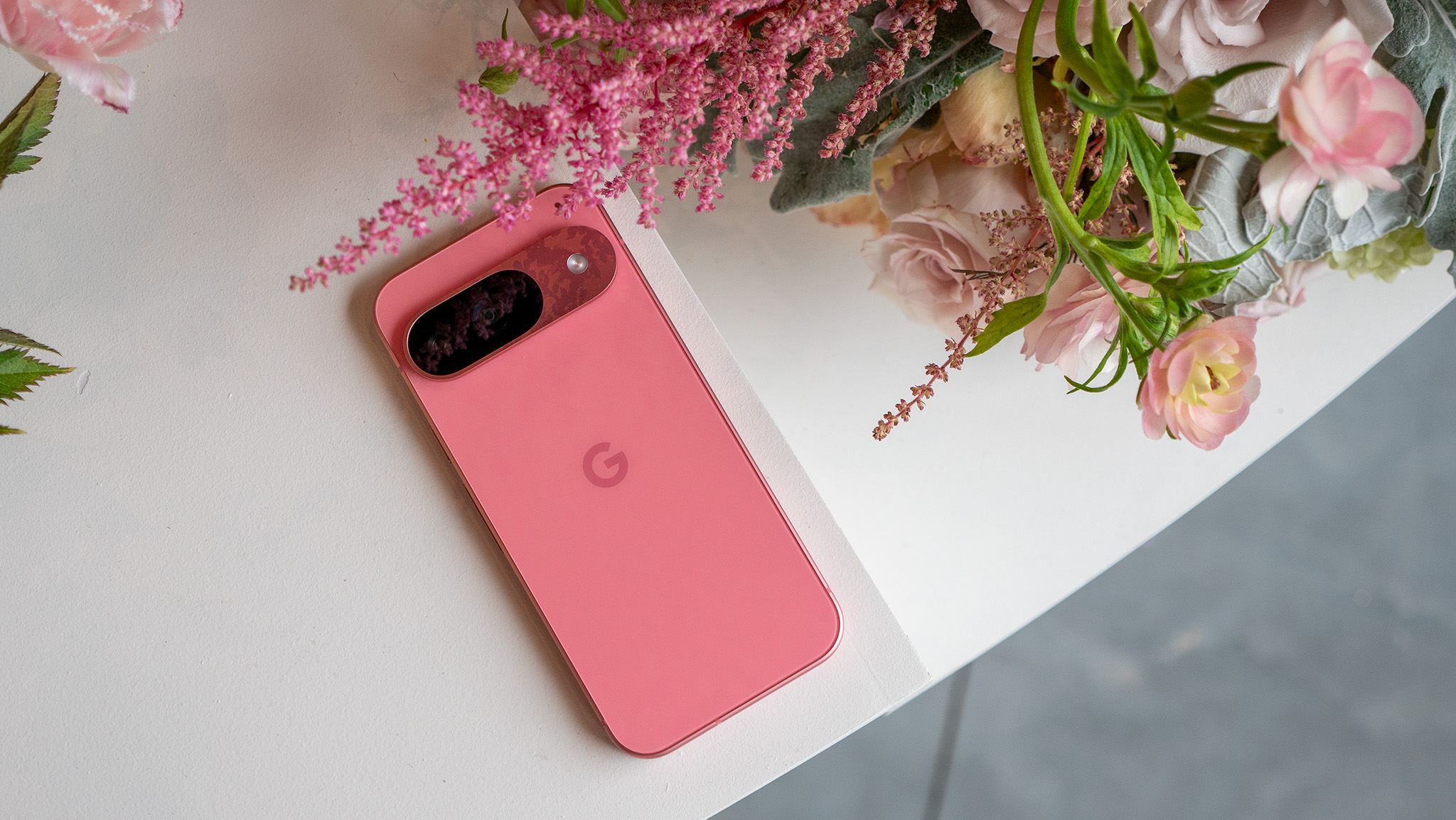
AI is undoubtedly the buzzword of 2024. Every tech company has jumped on the bandwagon, but few companies are doing it like Google. No, I don't mean the largely underwhelming Gemini upgrades to Google Search. I'm talking about the new Google Pixel 9 series phones.
With every demo of each new Pixel 9 feature at my hands-in event at Google's Pier 57 in New York, I thought to myself, "Google is doing the AI thing right. The rest of these companies are chumps." Standout features like Pixel Studio, Magic Editor upgrades, Call Notes, Pixel Screenshots, Add Me, Gemini Live, and even an upgrade to the classic "what's on my screen" feature blow the competition out of the water.
Then there's the big hardware redesign this year. It's going to be controversial, no doubt, as the Pixel 9 series is heavily iPhone-inspired. Flat, shiny side rails, curved corners, and flat front and back glass go a long way into making people think you're just using an iPhone...until you see the standout camera module, of course. The Pixel camera bar is dead, but the centered visor look still lives on.
Plus, we're finally getting a small Pro device for the first time in Pixel history. That's great news for people who like smaller phones but still want the best cameras. Let's unpack Google's non-folding Pixel 9 series, including the Google Pixel 9, Pixel 9 Pro, and Pixel 9 XL.
Google Pixel 9 series: Price and availability
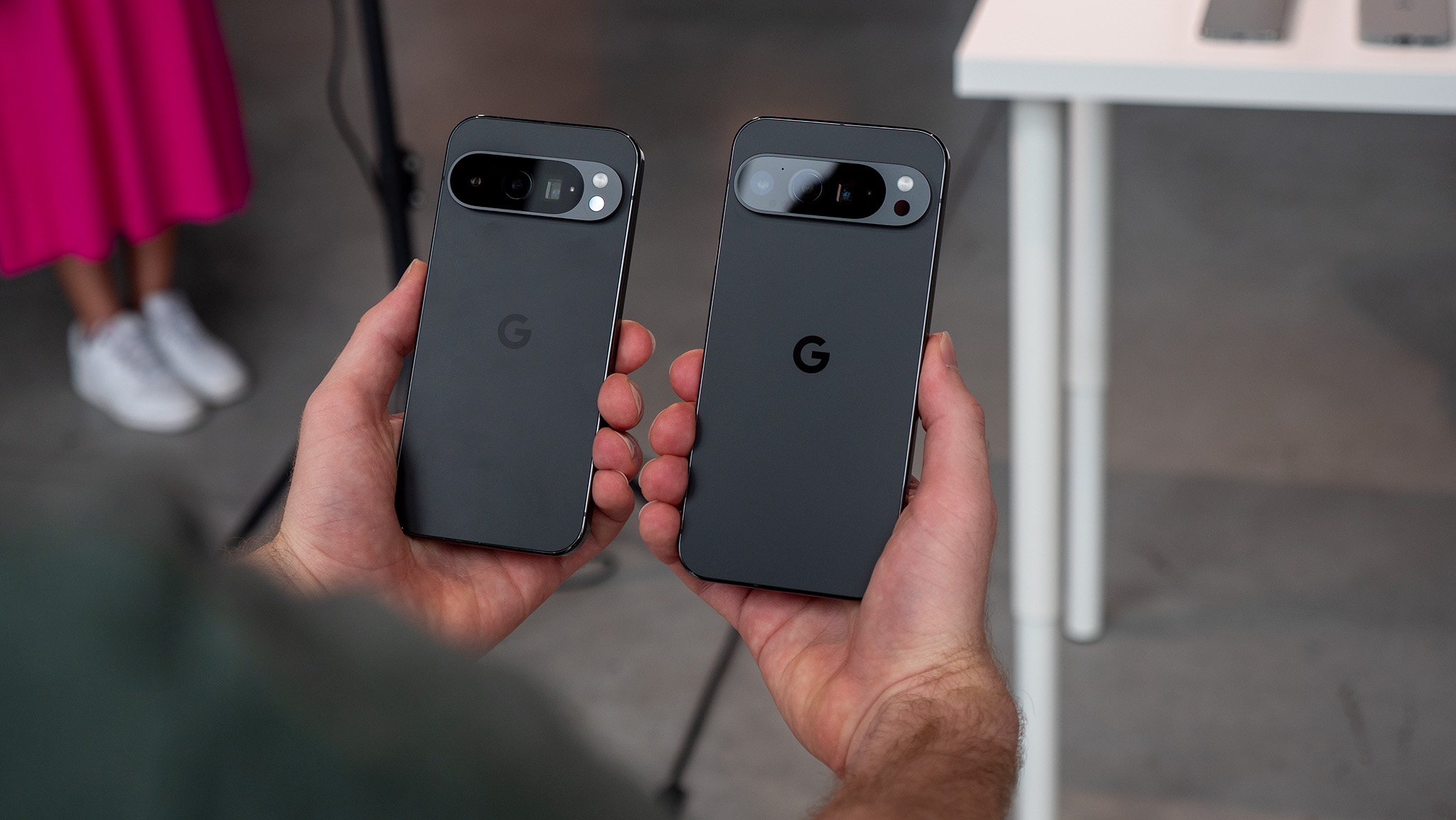
For the first time ever, Google is launching four new Pixel 9-branded phones as part of the Pixel 9 series. The main lineup includes the Google Pixel 9, Google Pixel 9 Pro, and Google Pixel 9 Pro XL. Google is also launching its second-generation folding phone, now known as the Google Pixel 9 Pro Fold.
The Google Pixel 9 retails for $799 and will be available on August 22. The Pixel 9 is available with 128GB or 256GB of storage, and both SKUs will ship with 12GB of RAM. The Pixel 9 is available in Obsidian, Porcelain, Wintergreen, and Peony colorways.
The Google Pixel 9 Pro retains the small size of the Pixel 9 but boosts features like an extra telephoto camera, better display, faster charging, and more. The Pixel 9 Pro retails for $999 for the 128GB model in early September, but you can opt for up to 1TB of storage at an additional cost. All Pixel 9 Pro models ship with 16GB of RAM.
Be an expert in 5 minutes
Get the latest news from Android Central, your trusted companion in the world of Android
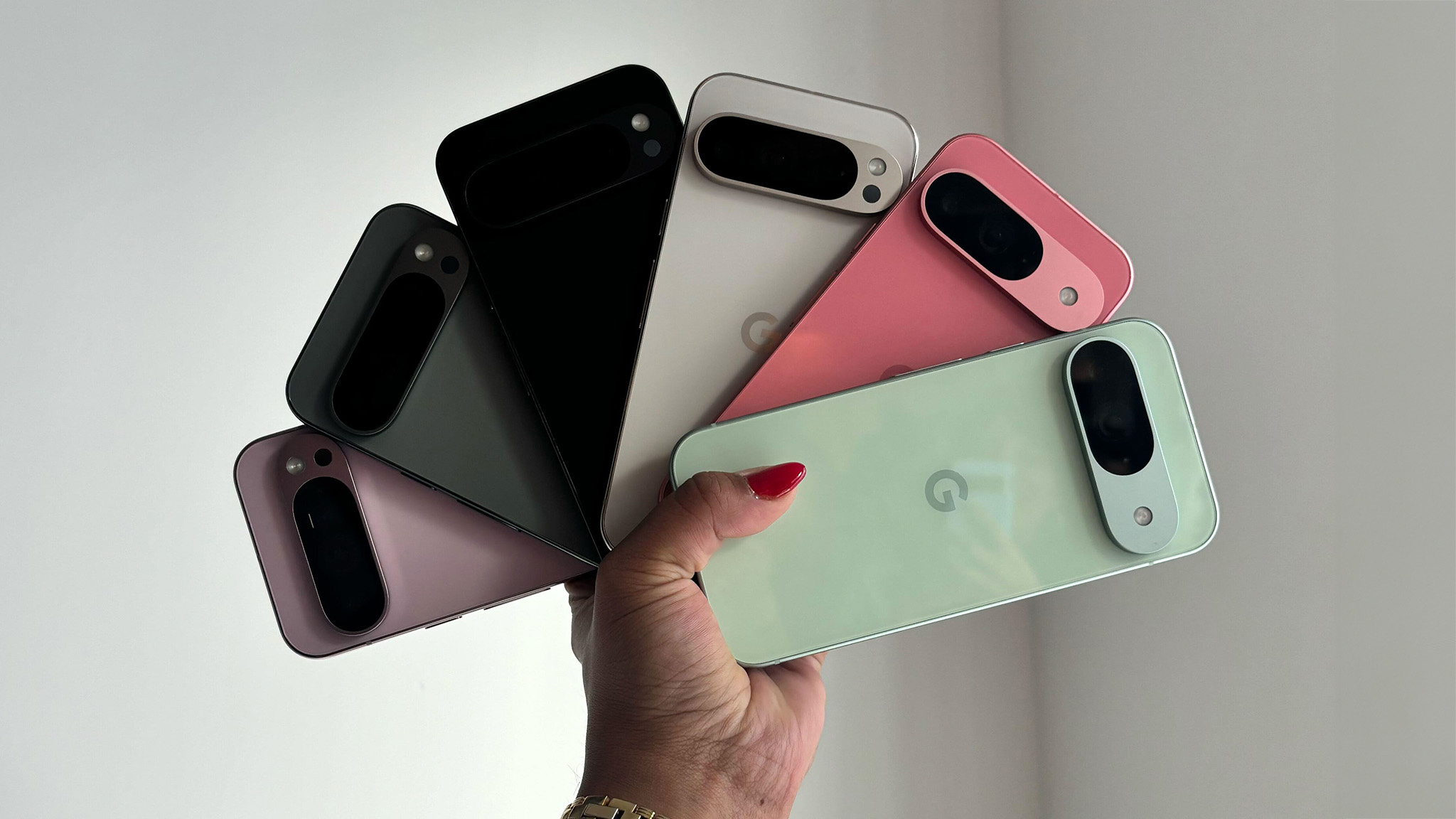
The Google Pixel 9 Pro XL is the largest non-folding Pixel this year, sporting a 0.5-inch larger display than the other two models as well as a 360mAh larger battery, starting at $1099 on August 22 with 128GB of storage. Up to 1TB of storage is available for an added cost, but all Pixel 9 Pro XL models ship with 16GB of RAM regardless of storage amount.
Both the Pixel 9 Pro and Pixel 9 Pro XL are available in Obsidian, Porcelain, Hazel, and Rose Quartz colorways.
All Pixel 9 models include Pixel VPN at no additional cost. Google is also including one year of Gemini Advanced with every Google Pixel 9 series phone, which would normally cost $20 per month with the AI-tier Google One subscription.
Google Pixel 9 series: Hardware, design, and display
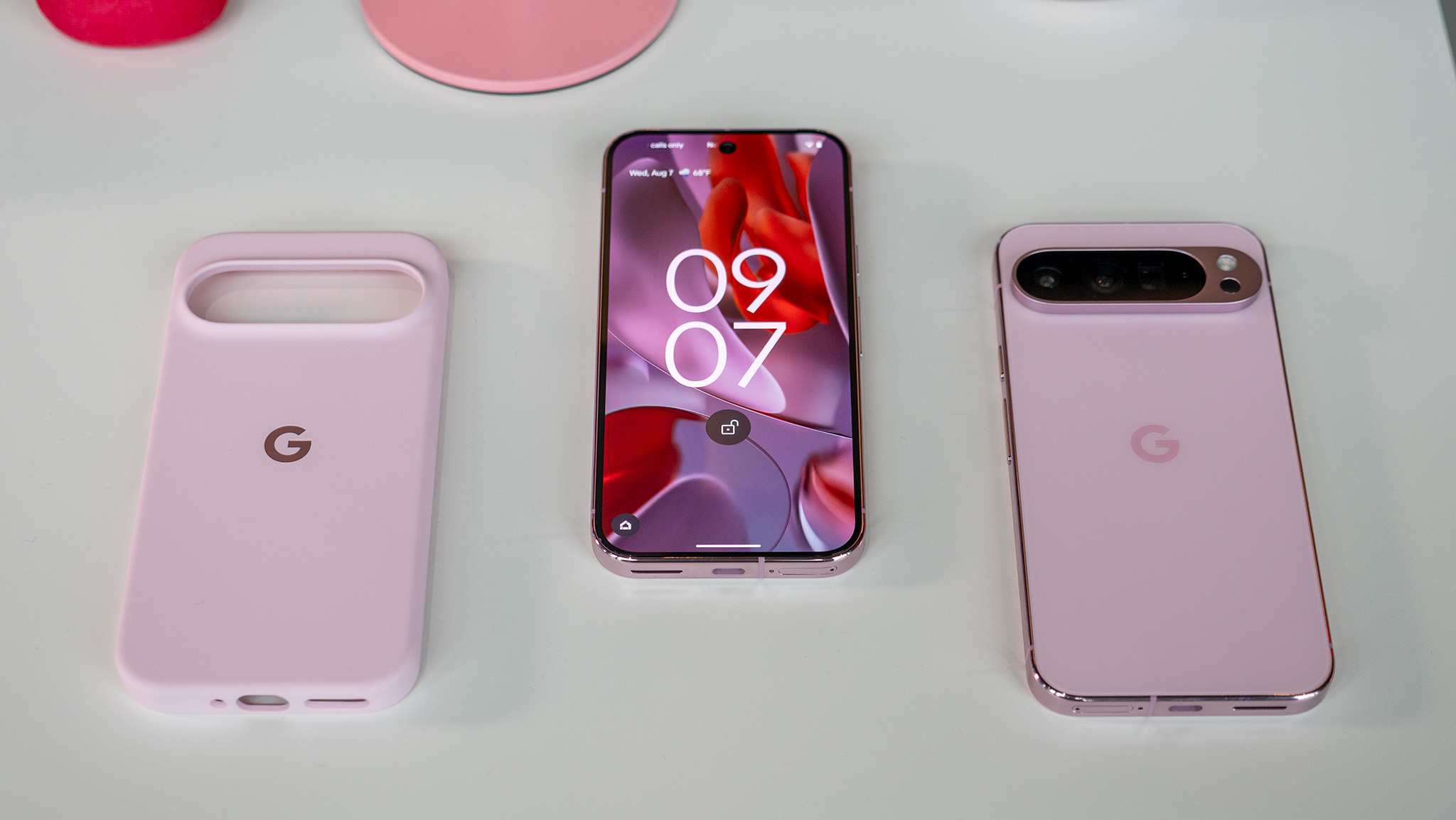
There's little doubt that the Pixel 9 series' design language borrows heavily from the last few iPhone models. Flat, shiny rails adorn all four sides of the phone, and the back is either matte or shiny glass, depending on the colorway you choose. All models also feature an entirely flat front and back glass, rounding out what Google calls a "sculpted" look.
I didn't much care for the design when it first leaked but seeing it in person is much nicer. Included in that is the new camera bar design which is yet another bold redesign of what's become an iconic Pixel design trait. I prefer the previous camera bar designs but this recent change was made to help Pixels better fit into phone cases, as Google revealed in a May 2024 interview.
My biggest problem with the new design is that it does away with the "friendly" look phones like the Pixel 8a have and replaces it with something a lot more industrial-looking. Sure, it looks more "premium" but I'm not sure this look is what comes to mind when I think "Pixel."
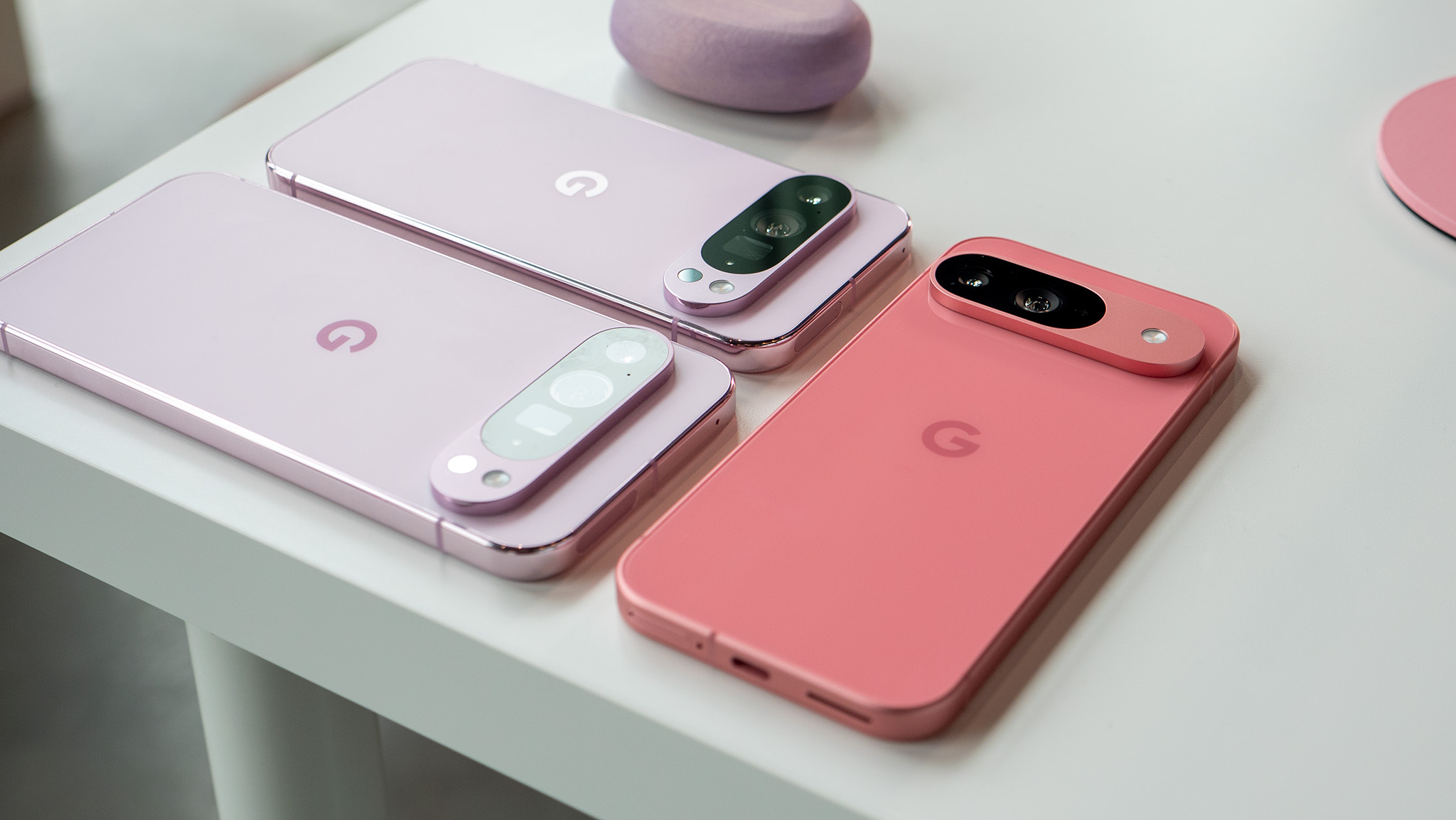
The new design replaces the "friendly" look of previous Pixel phones with something more sterile and industrial.
The camera bar is an identical size and shape on the Pro and non-pro models. The only difference is that the less expensive Pixel 9 removes the telephoto camera and has more metal housing in its place.
In short, if you like flat phones, this is as flat as they come, and you're going to love it. Even if you don't like the design, Google says these models are "twice as durable" as previous Pixels, including Gorilla Glass Victus 2 and an improved aluminum structure.
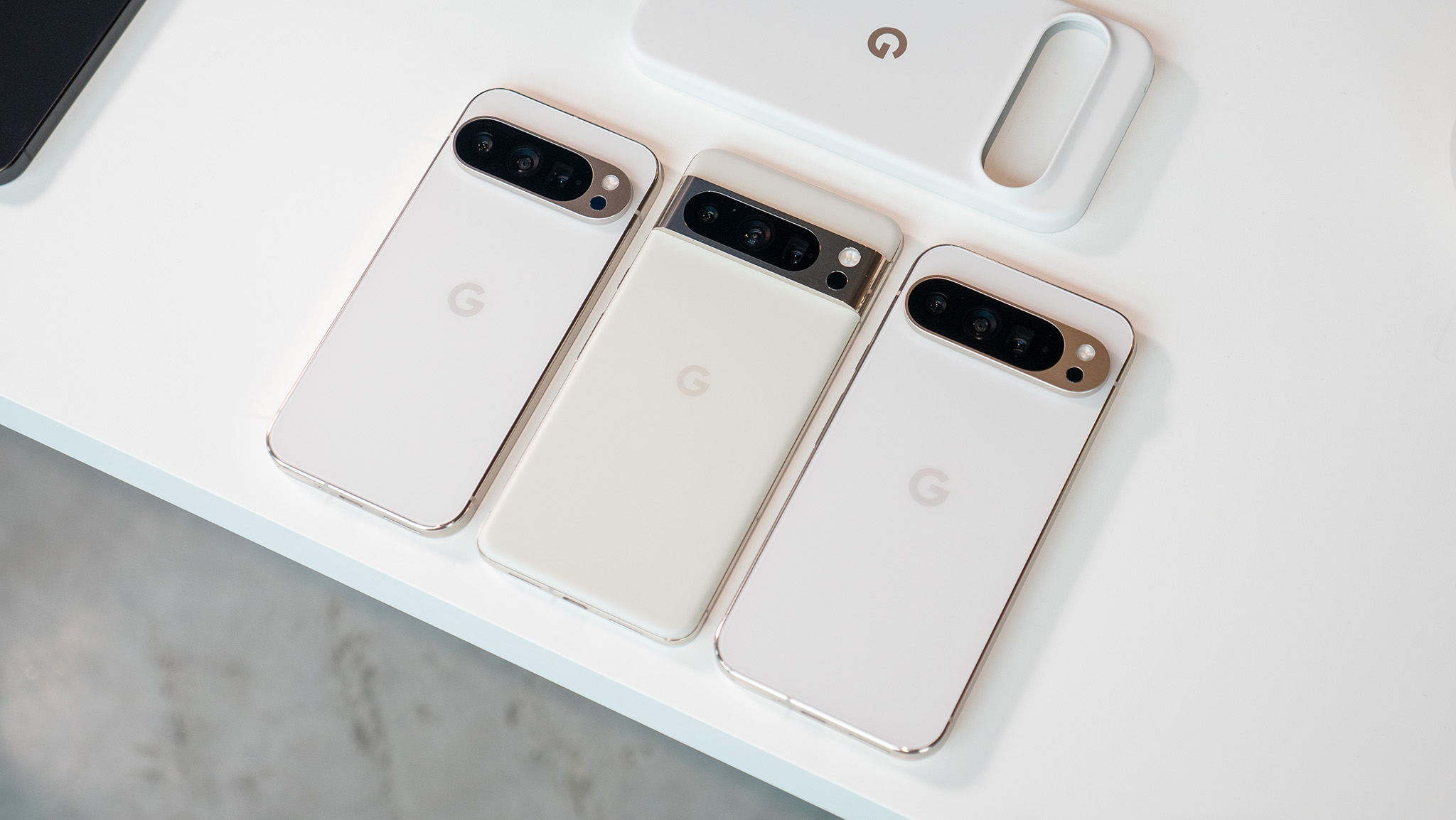
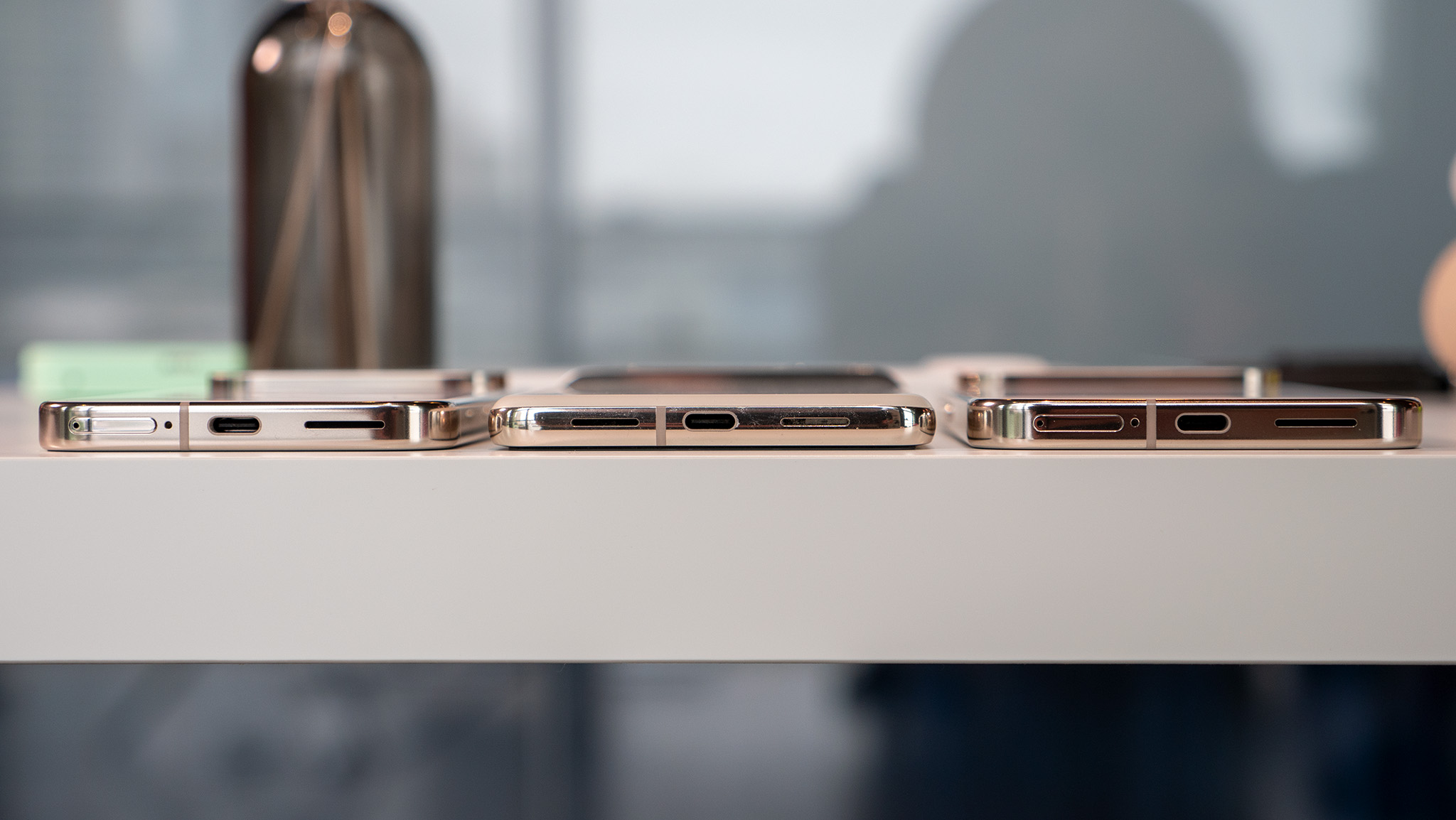
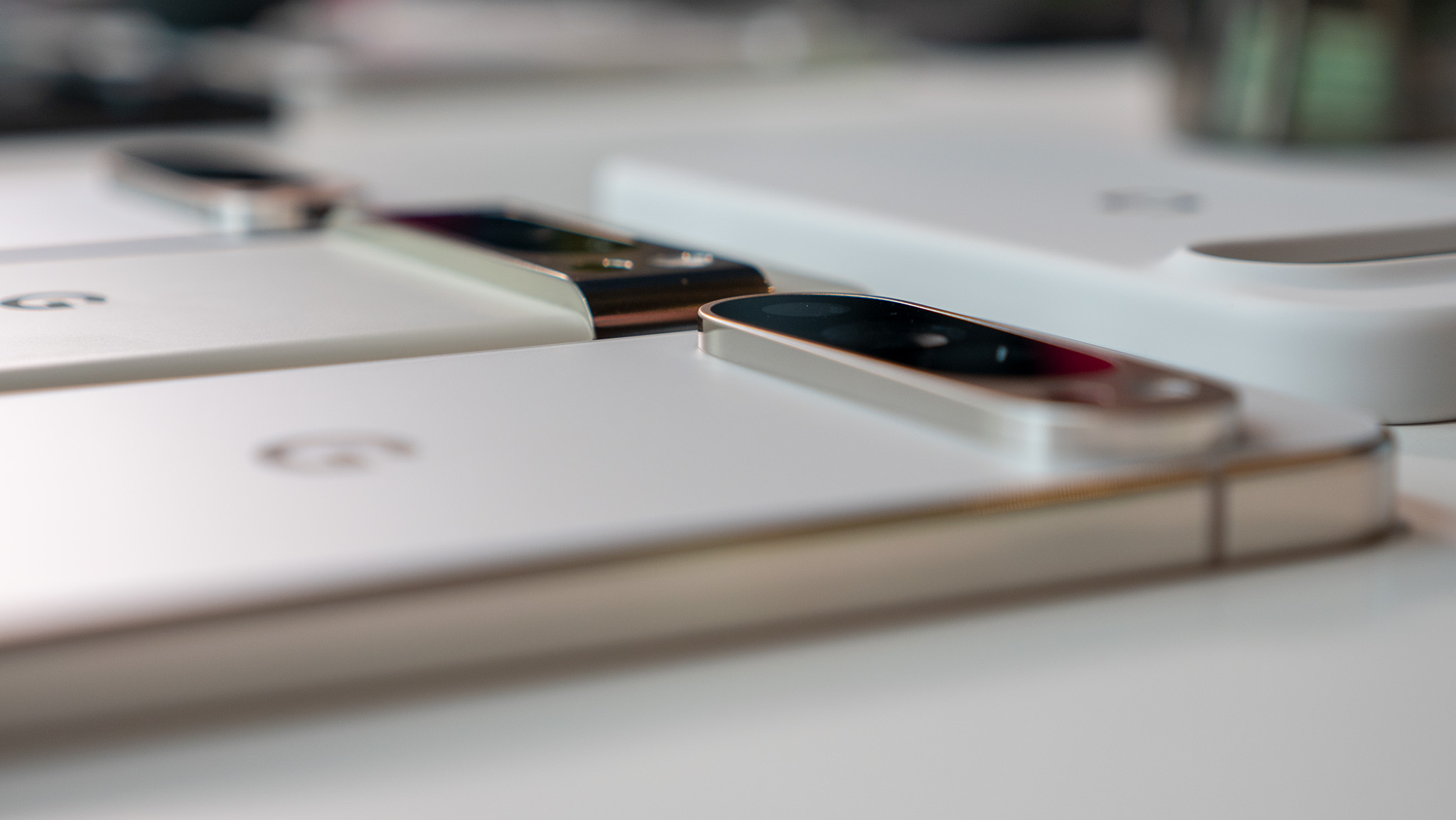
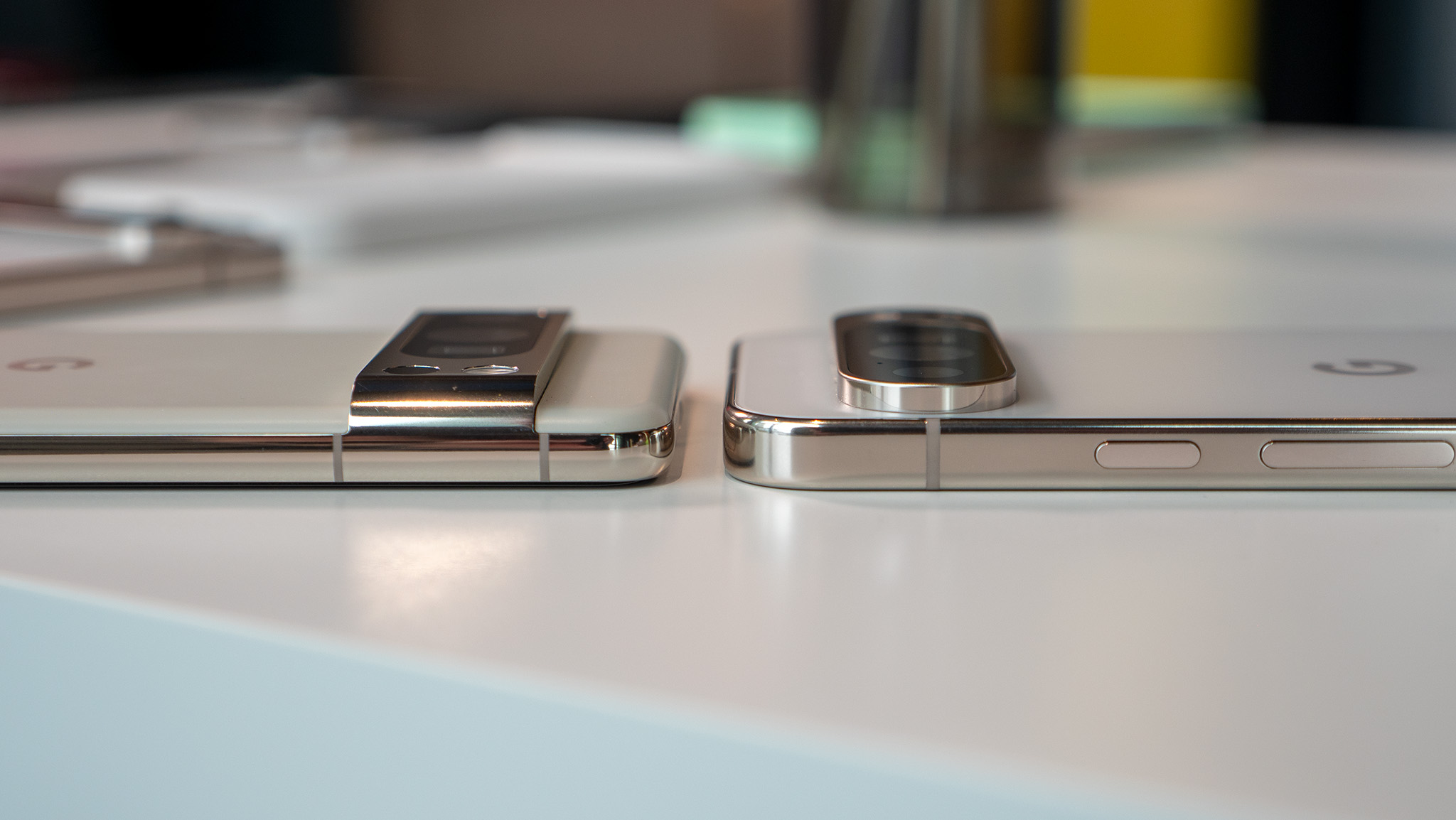
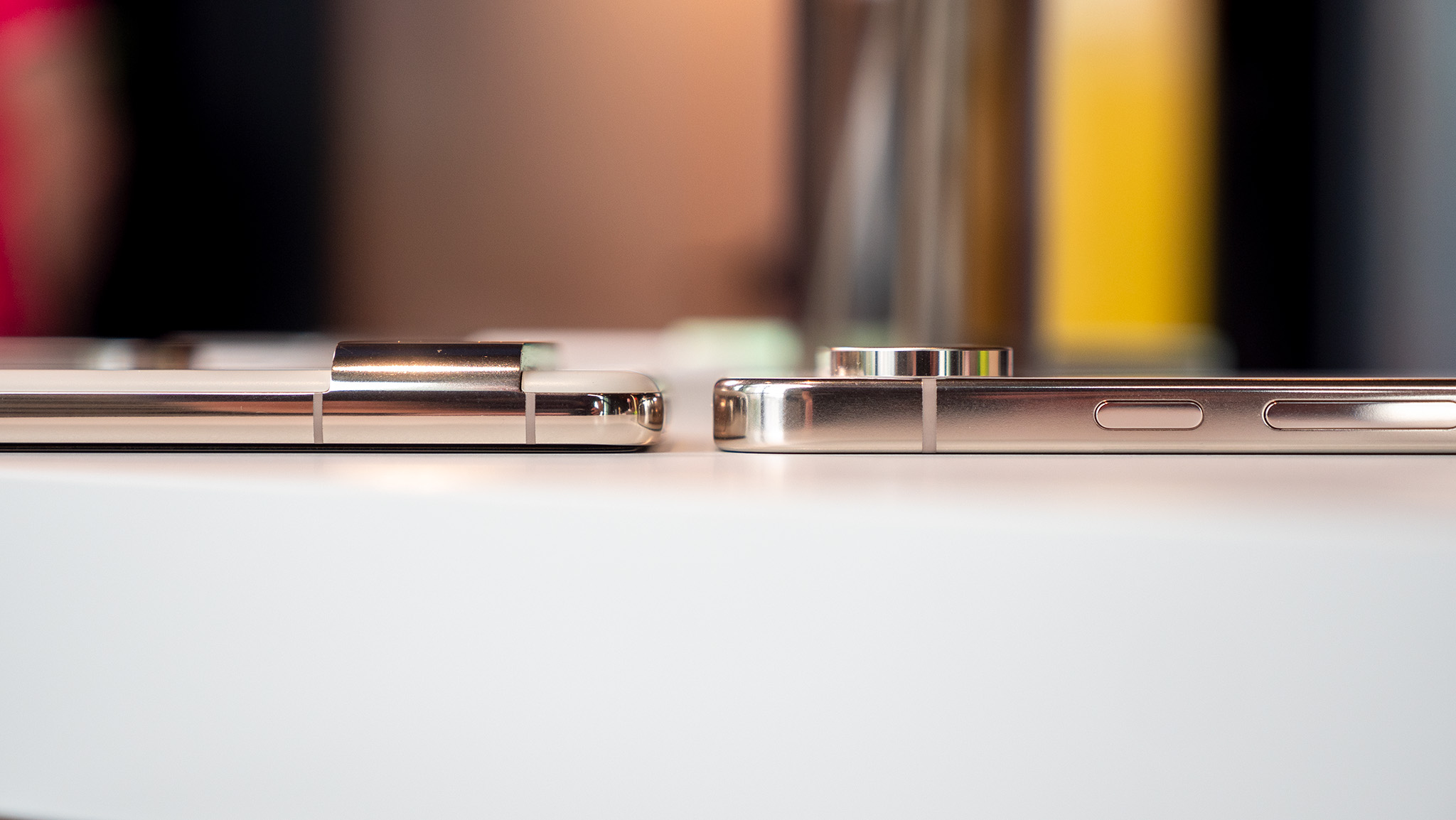
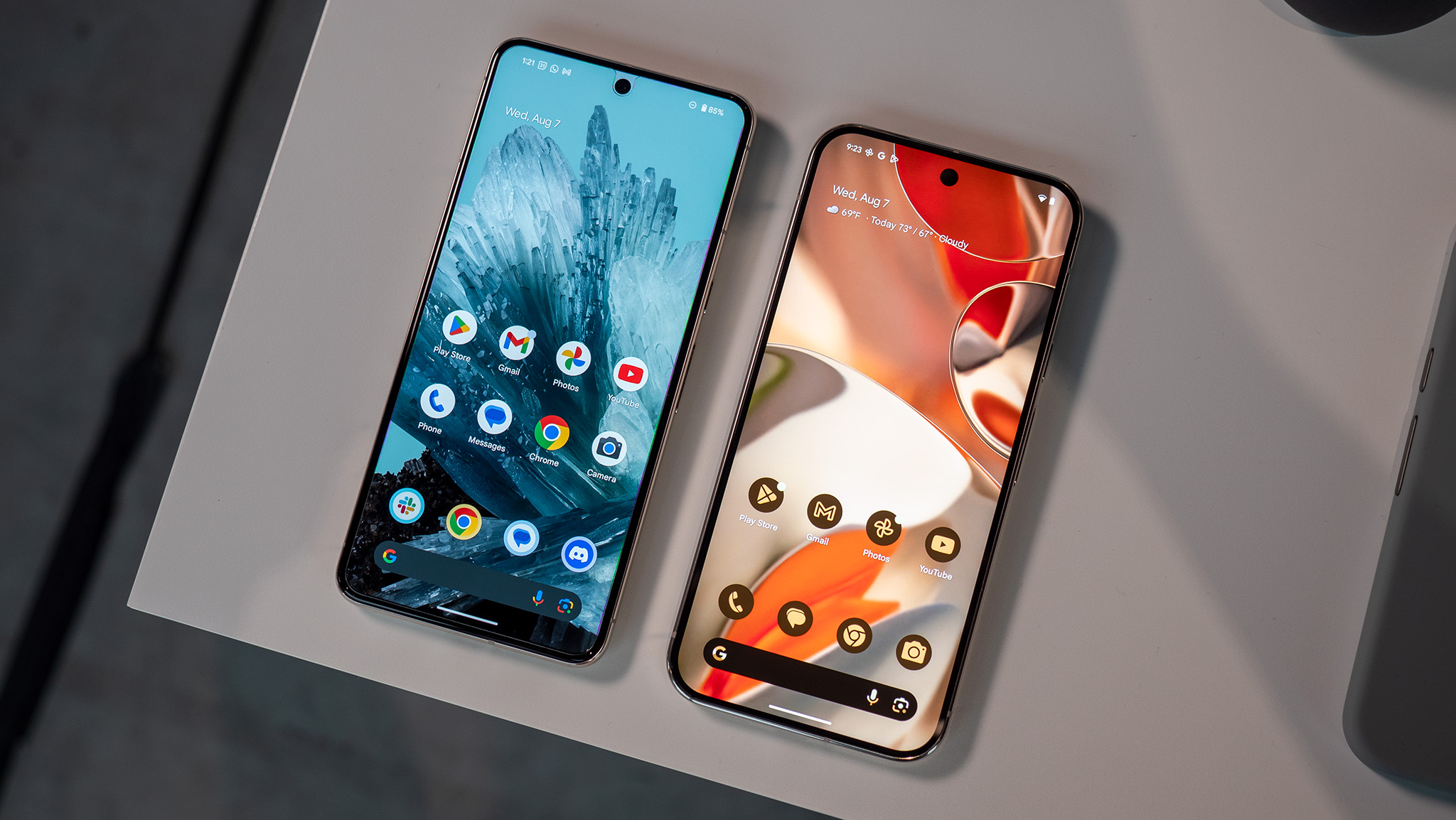
If you like flat phones, this is as flat as they come and you're going to love it.
The display is seeing its usual range of improvements across the board, including up to 2700 nits peak brightness on the Pixel 9 and up to 3000 nits peak brightness on the Pixel 9 Pro and 9 Pro XL. The Pixel 9's LTPO display supports 60-120Hz refresh rates, while the 9 Pro and 9 Pro XL range from 1-120Hz dynamically based on content.
Unfortunately, for PWM-sensitive people like me, Google hasn't taken the hint and improved its PWM rate. The Pixel 9 series utilizes 240Hz PWM dimming across the board, meaning the Pixel now has the slowest PWM rate on any major phone. The lone exception is the Galaxy Z Flip 6. We know that Pixel displays can push this number 20x higher, so we're not sure why Google hasn't made any positive changes yet.
Everyone else can enjoy what Google calls its "best display ever," including smaller, more uniform bezels all around. I inspected each phone closely at my hands on and while there's a small improvement in bezel size over the Pixel 8, it's quite minimal. The Pixel 8 Pro's bezels were already small enough to not be a problem, though, so this isn't a negative comment at all.
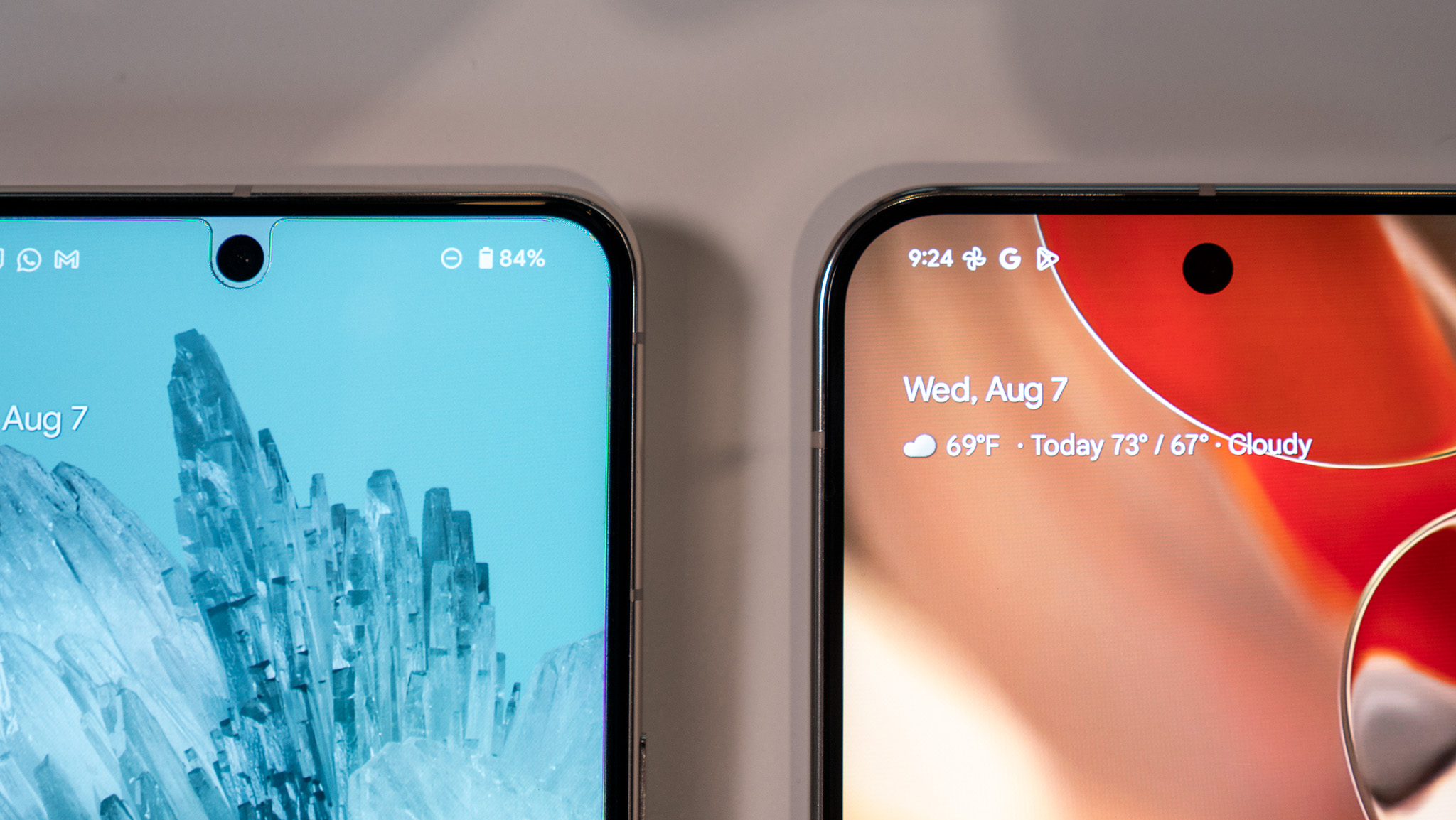
The display is brighter than ever but Google still lags behind the competition with a slow PWM rate.
Under the display is a new ultrasonic fingerprint scanner that promises to be better than the optical ones Pixels have used in the past. I didn't have any issues with the one on the Pixel 8, but we'll need to wait for the review to see if the new scanner will make a noticeable improvement.
All Pixel 9 models feature more RAM than ever, ensuring multitasking should feel fantastic all around. That should also pair nicely with the Google Tensor G4 processor inside, which is said to launch apps 17% faster and browse the web 20% faster.
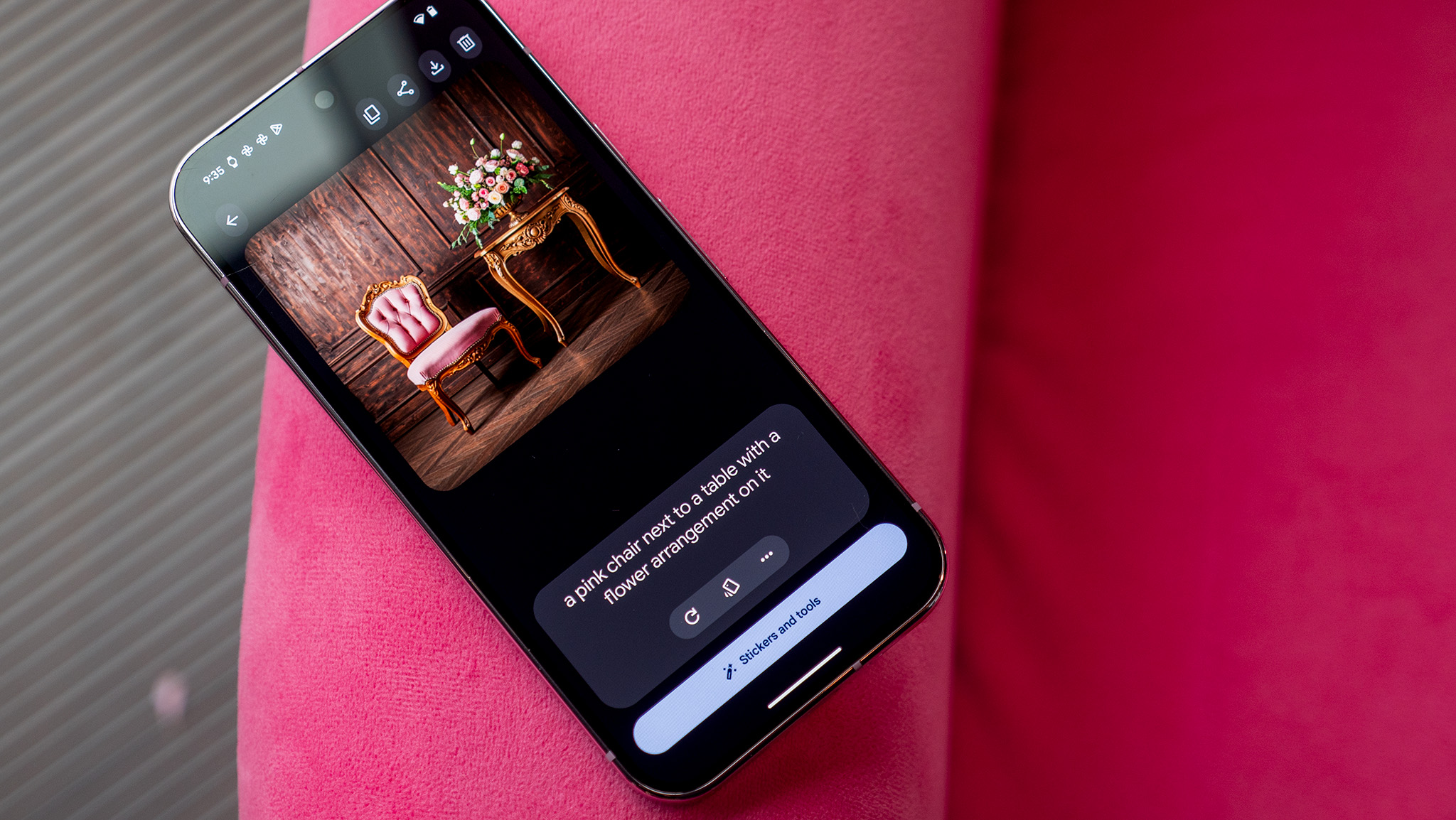
As Android Central Senior Editor Jerry Hildenbrand wrote recently, the Tensor G4 is built specifically for Google's vision of its smartphones. That includes an industry-leading local AI compute rate of 45 tokens per second. By comparison, the Snapdragon 8 Gen 3, used in every other leading Android phone, can only process 20 tokens per second.
That means it's more likely that Google's AI-based features will remain onboard and private versus other companies needing to send that data to the cloud for computing.
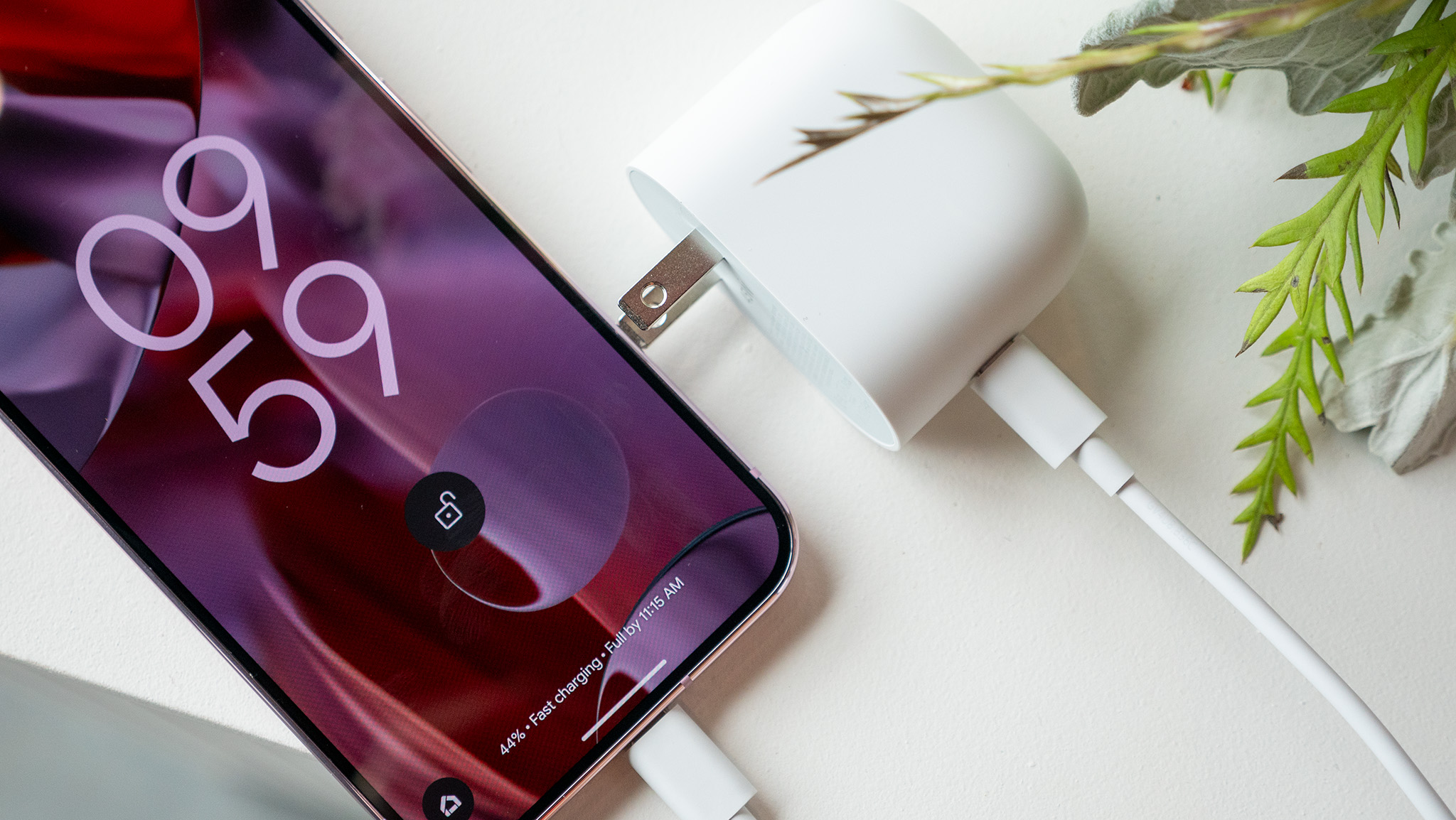
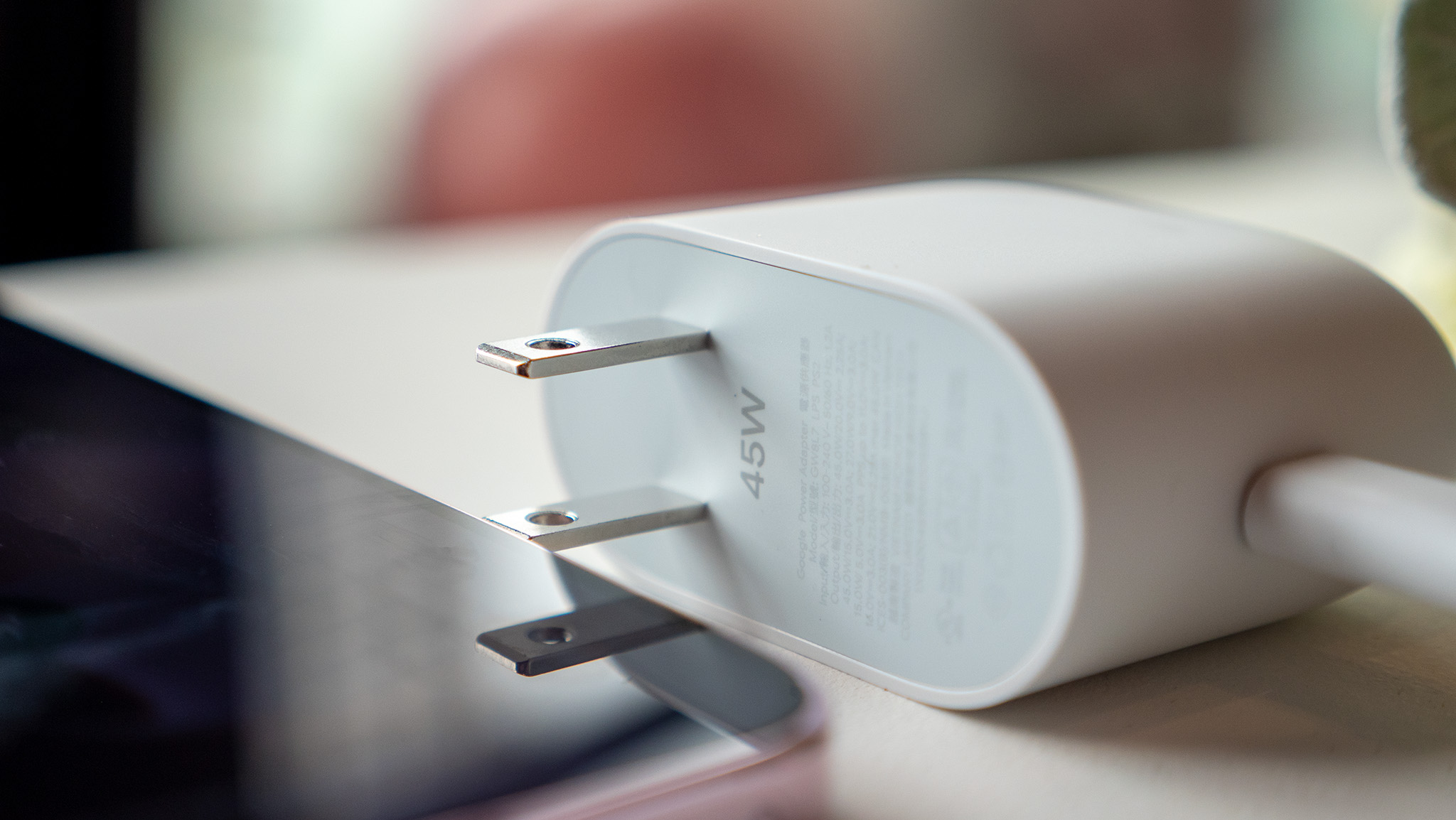
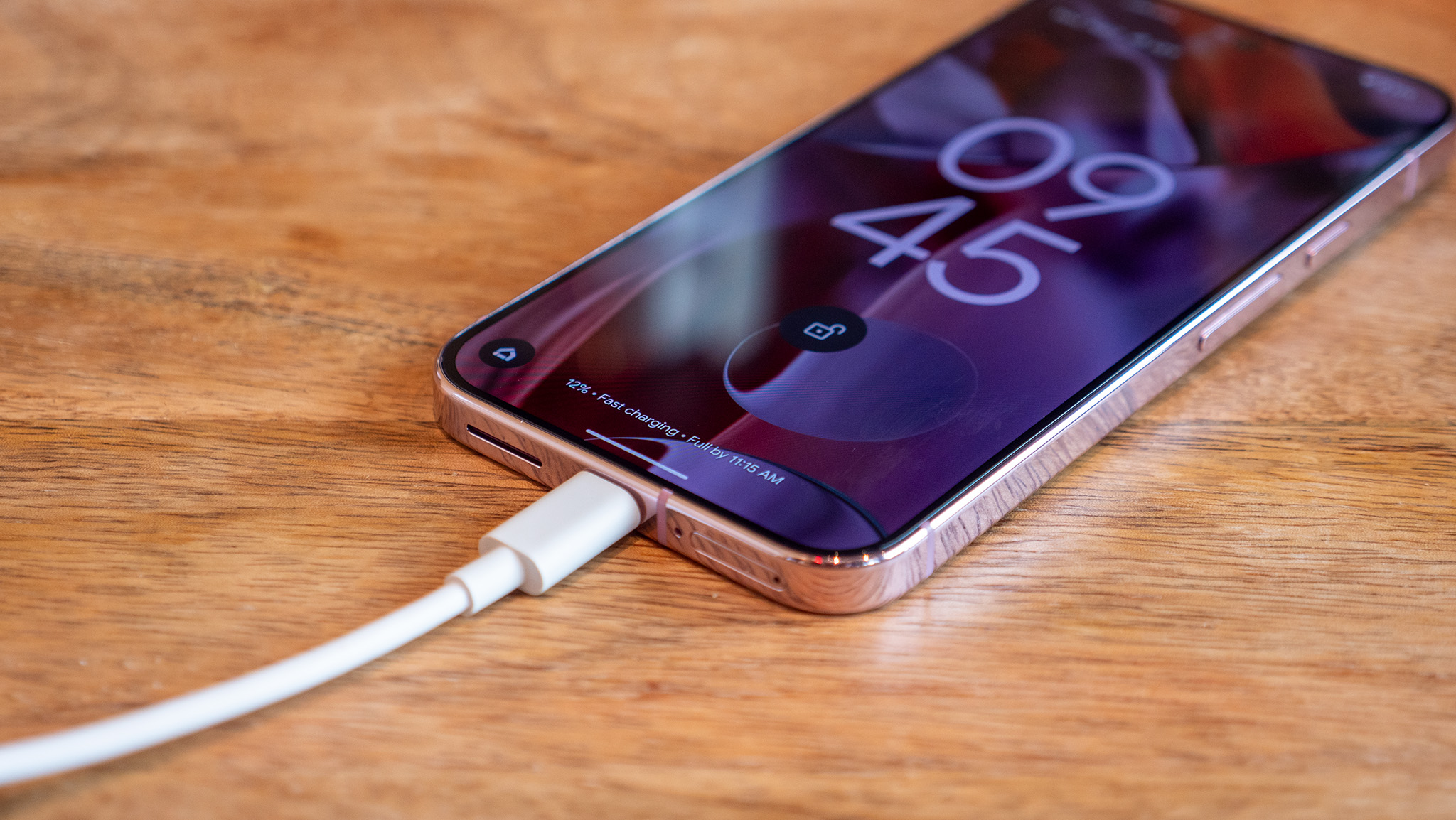
Tensor G4 features more than double the onboard AI processing power compared to the Qualcomm Snapdragon 8 Gen 3 in all other flagship Android phones.
Google has also made improvements and additions throughout the rest of the phone. The Pixel 9 and 9 Pro feature a 4700mAh battery, up from 4575mAh on the Pixel 8. The Pixel 9 Pro XL doesn't get a battery size increase, but all models are seeing much faster charging this time around.
Google says the Pixel 9 and Pixel 9 Pro charge from 0-55% in 30 minutes, while the Pixel 9 Pro XL charges from 0-70% in 30 minutes. I was able to briefly test this at the hands-on event, plugging in a dead Pixel 9 Pro XL and finding it at 44% battery in just 15 minutes with the new 45W charger. That's a substantial increase in speed when compared to previous Pixels.
Google is also rolling out SOS satellite calling and improved Clear Calling on the Pixel 9 series, but I wasn't able to test these out at the hands-on event.
Google Pixel 9 series: Cameras
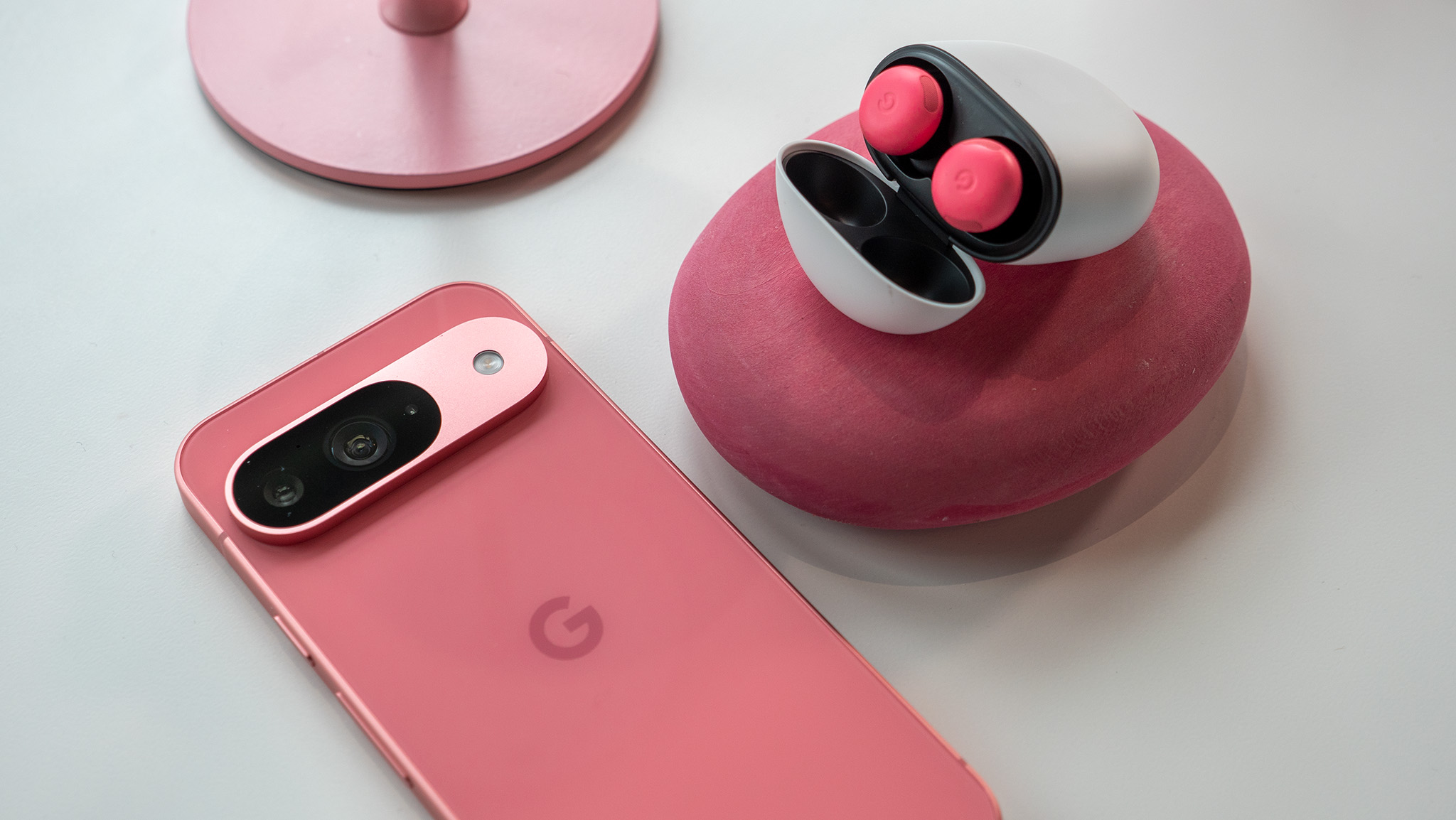
What's a Pixel launch without new camera tech? The smaller Pixel 9 Pro features a telephoto camera for the first time in Pixel history, while both Pro models pick up an improved 42MP front-facing camera with a 103-degree angle field of view, autofocus, and 30% better light sensitivity than Pixel 8 Pro.
The cheaper Pixel 9 features what Google calls an "upgraded" 10.5MP front camera with autofocus and a 95-degree FoV. It utilizes the same 50MP main rear camera as the Pixel 8 but upgrades the ultrawide camera to a 48MP f/1.7 ultrawide/macro camera, up from 12MP f/2.2 on the Pixel 8.
Both the Pixel 9 Pro and 9 Pro feature the same 50MP wide and 48MP ultrawide/macro cameras as the Pixel 9 but add a 48MP 5x telephoto camera for upgraded zoom detail. The Ultrawide camera's lens has been upgraded over the Pixel 8 series with a new lower aperture but a slightly less wide FoV.
But, as usual, the hardware isn't the real selling point of a Pixel. Rather, Google has further beefed up its already class-leading software, including some new features that'll blow you away. Of all the new features, Add Me was my favorite of the event.
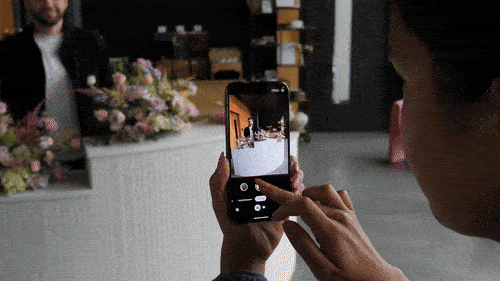
Add Me allows you to take a group photo and later add the photographer to that same picture using an incredibly impressive augmented reality model. When you start the Add Me mode from the camera UI, you'll briefly move the phone in a circle to scan the scene (and people) you're about to take a picture of.
Once that photo is taken, pass the phone to someone that was in the first picture and you'll move into the photo frame. The Pixel 9 convincingly recreates the scene in front of you, giving you visual cues to line up the second shot so it looks natural. The result was astounding and incredibly convincing.
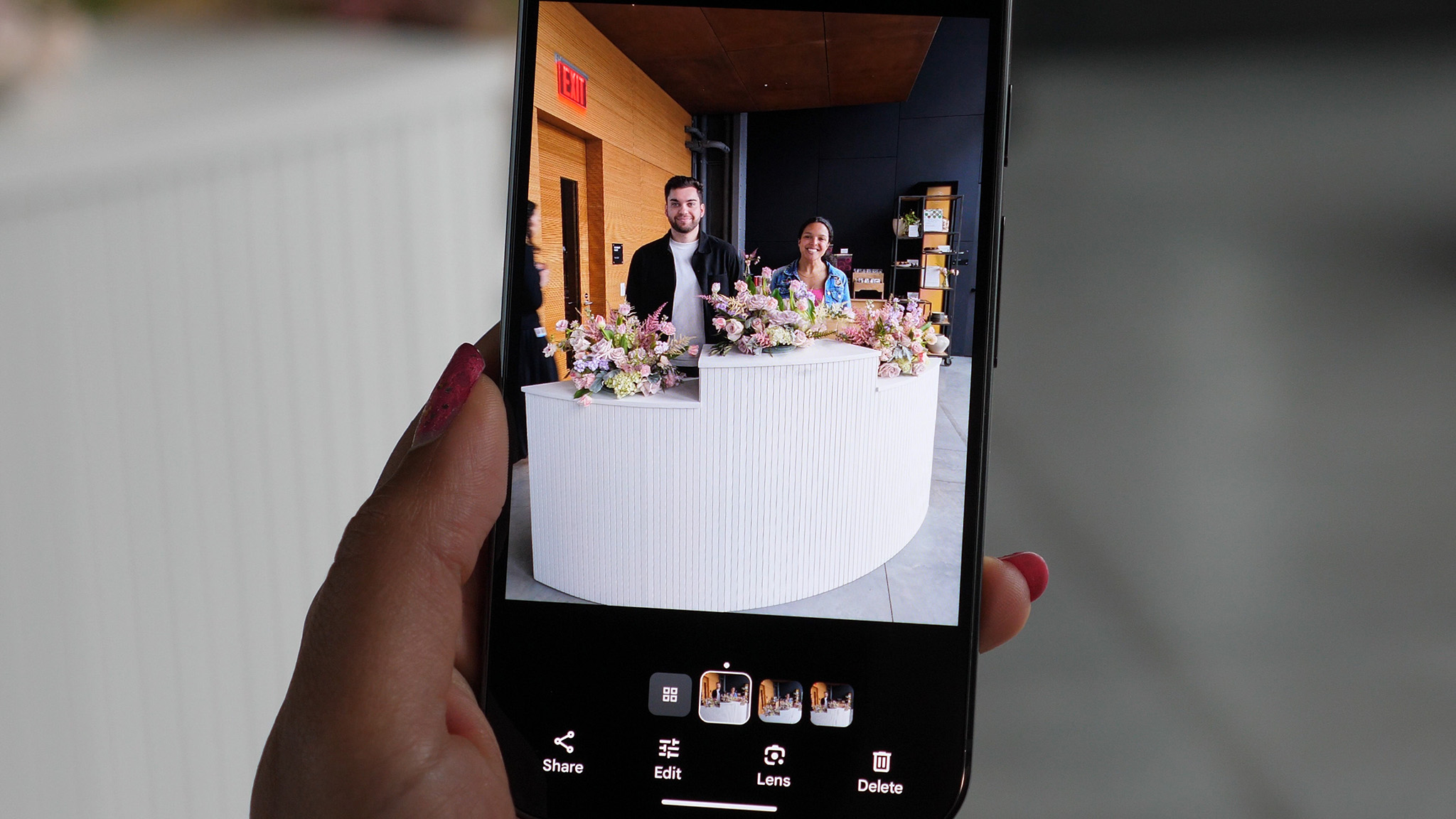
The second cool set of features resides in Magic Editor, which is getting a Pixel 9 upgrade. Reimagine lets you swap out any part of the photo with something AI-generated. In the example below, three people were sitting on a concrete wall. Tapping the wall highlighted it in Magic Editor, and a text prompt could be entered to swap out the wall for whatever we wanted.
One example shows a waterfall, while yet another shows "Minecraft mushrooms" in the closest copyright-free way Gemini could. All of this was done on-device and took just a second or two to generate. It was unbelievably fast.
The second feature, Auto Frame, lets you properly "reframe" a shot using common photography tricks like the rule of thirds. Gemini will auto-frame your shot and present you with several additional options, including wider shots with AI-generated content to fill in the blanks.
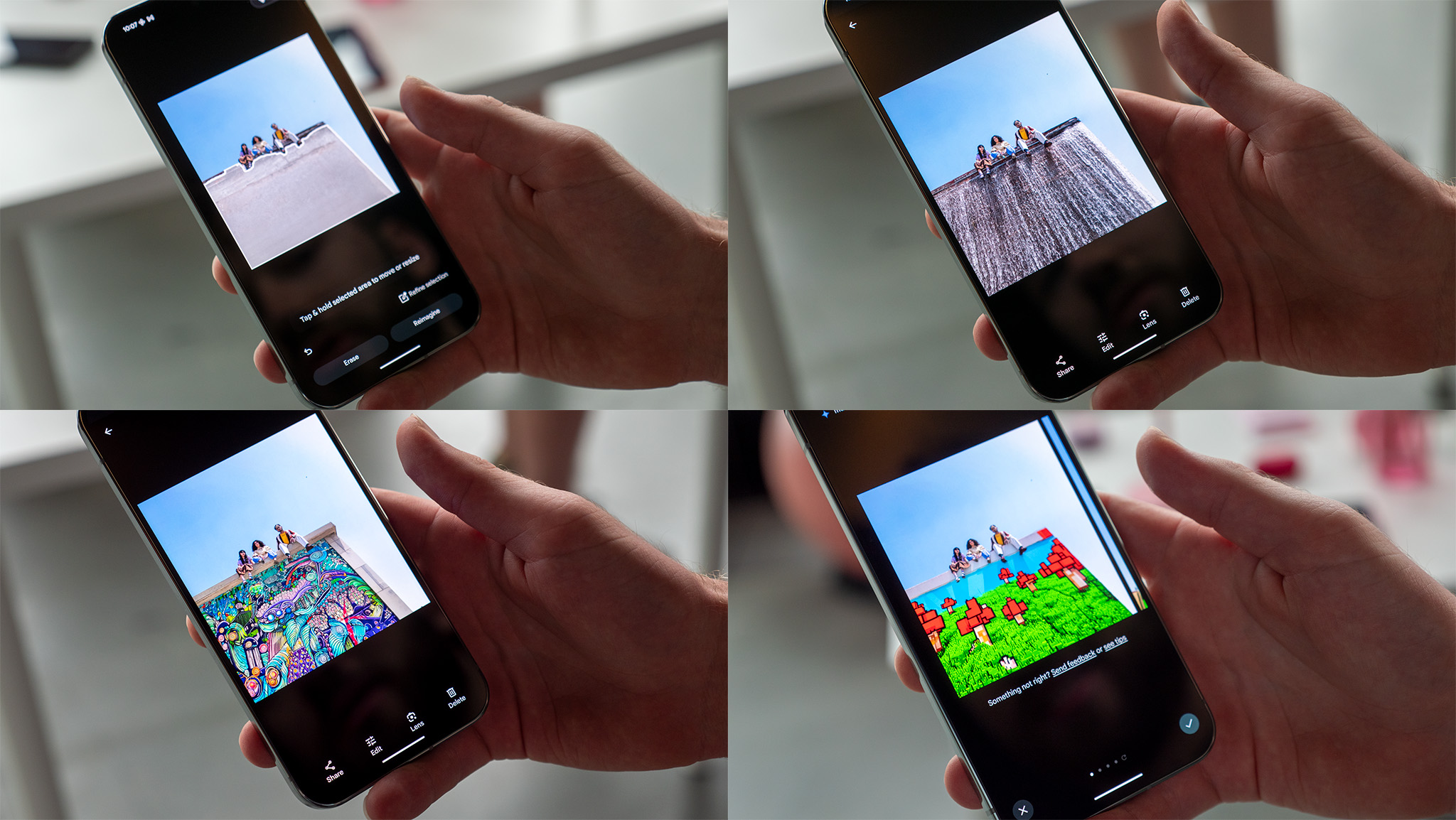
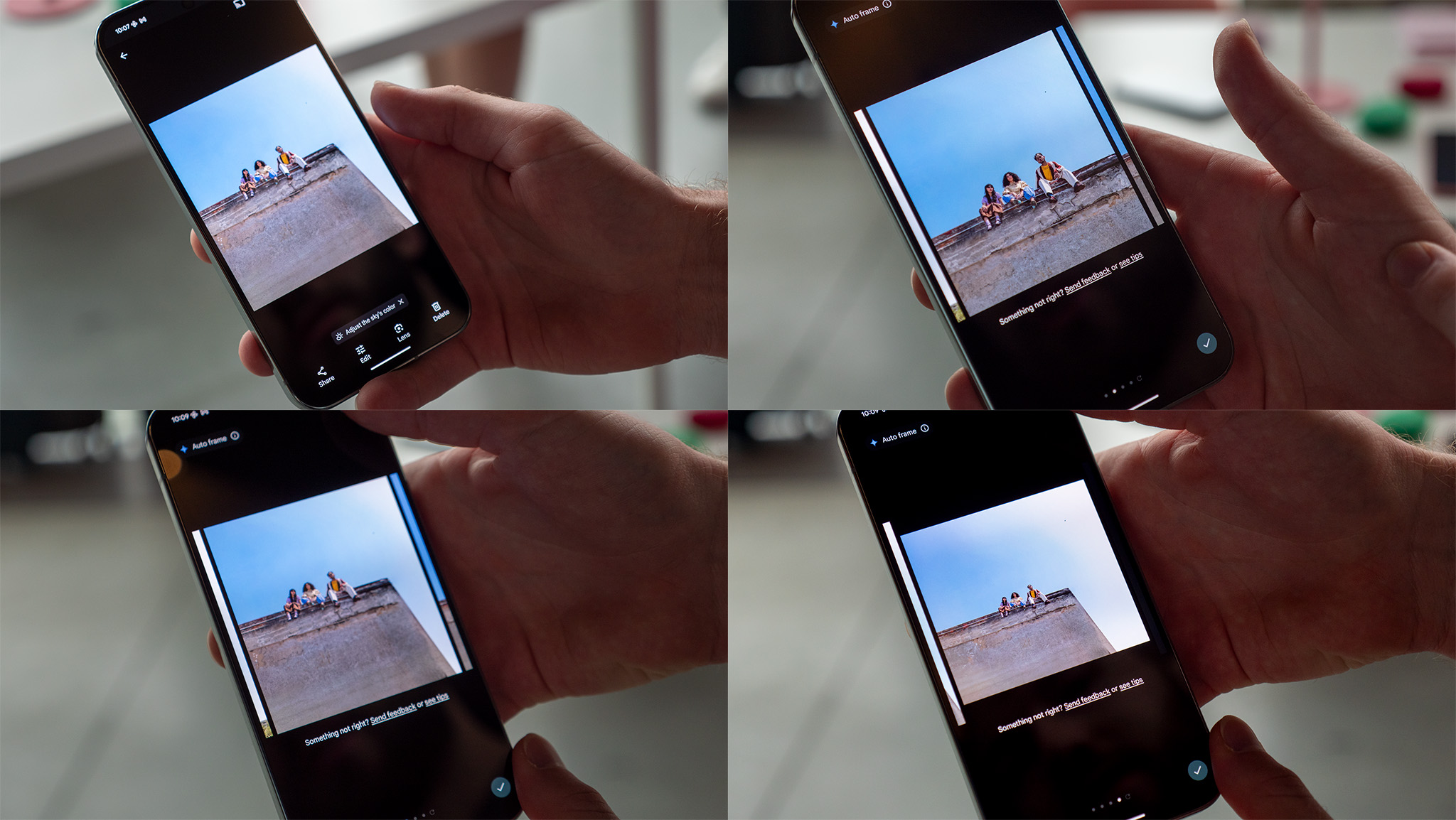
Google redesigned the panorama mode to work more like the classic Photosphere mode, so you'll move the phone to the next dot on the screen rather than trying to slide the phone in a straight line. This UI is not only more user-friendly but also allows Google to utilize Night Sight on panoramic photos since you'll pause for a second each time you reach a dot.
Other camera improvements include "improved Night Sight video" as well as doubling the processing speed of Video Boost compared to Pixel 8 Pro. Video Boost now also supports up to 8K video, but I didn't have the chance to demo these at the event.
Google Pixel 9 series: Tons of new features
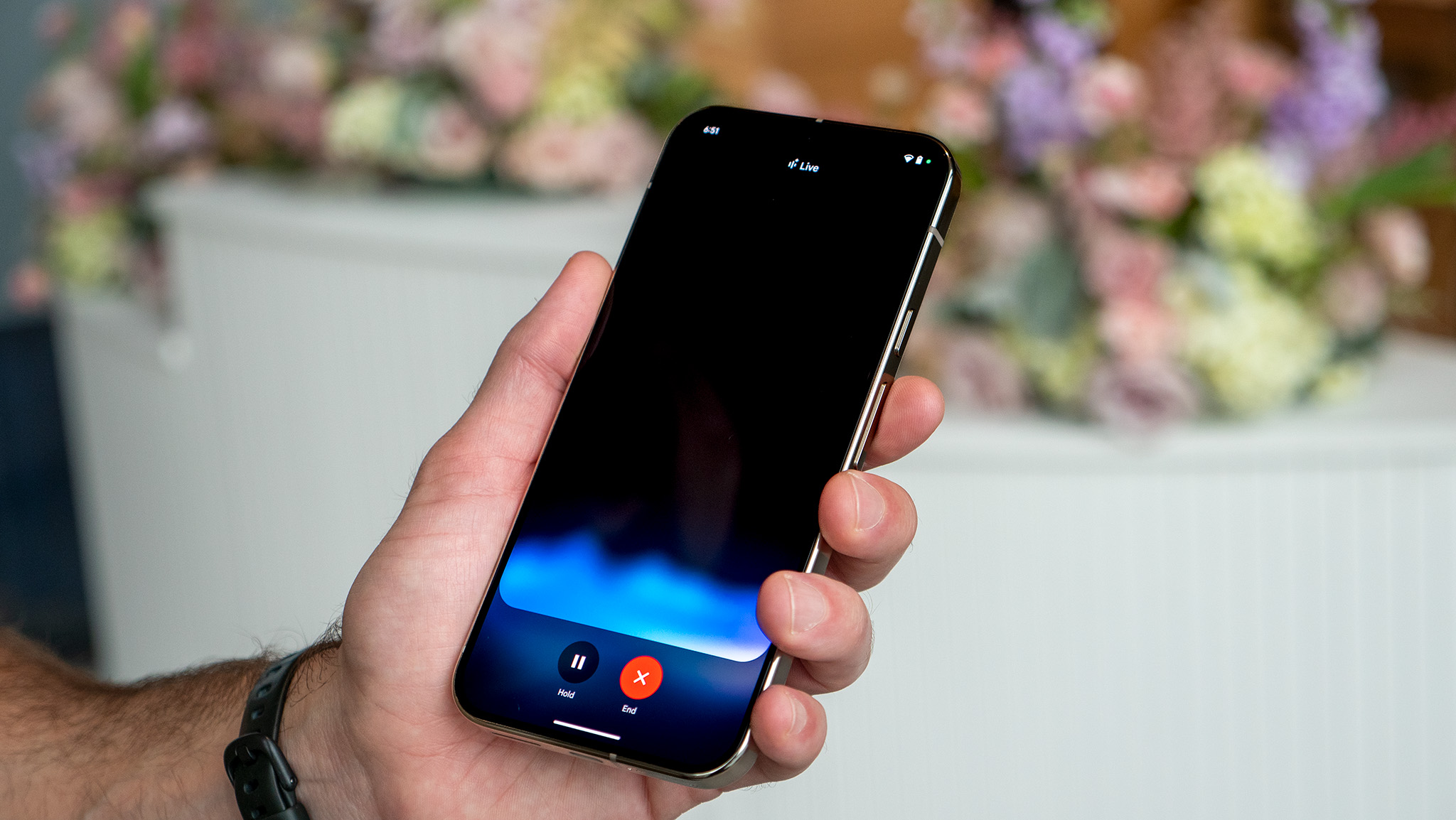
Gemini was at the core of every new Pixel 9 feature, but mostly not in the way you would expect. Let me get the "boring" parts out of the way first. All Pixel 9 users get Gemini Advanced for free for the first year. After that, you'll need to subscribe to the usual $20-per-month Google One plan that includes extra cloud storage and other goodies.
Google is also launching Gemini Live with the Pixel 9, giving users "the most natural way to have a free-flowing conversation with Gemini." Gemini's product lead gave me a 5-minute demo showcasing several different ways to talk to Gemini, including interrupting it plenty of times with new questions, follow-up questions, or changing the topic entirely.
Gemini Live is exclusive to the Pixel 9 for now and lets you naturally talk to Gemini as if it were a person.
Gemini responded incredibly convincingly, and I couldn't shake the feeling of being in a sci-fi movie. That, coupled with the 10 new voices for Gemini all processed on the Pixel 9's Tensor G4 processor, meant that conversation wasn't just a natural feeling. It was also instant.
Google will soon debut Gemini Live add-ons, including ways to hook it into Google Keep and other Google apps and services so you can have Gemini directly make keep notes for you. That'll be handy for grocery lists.
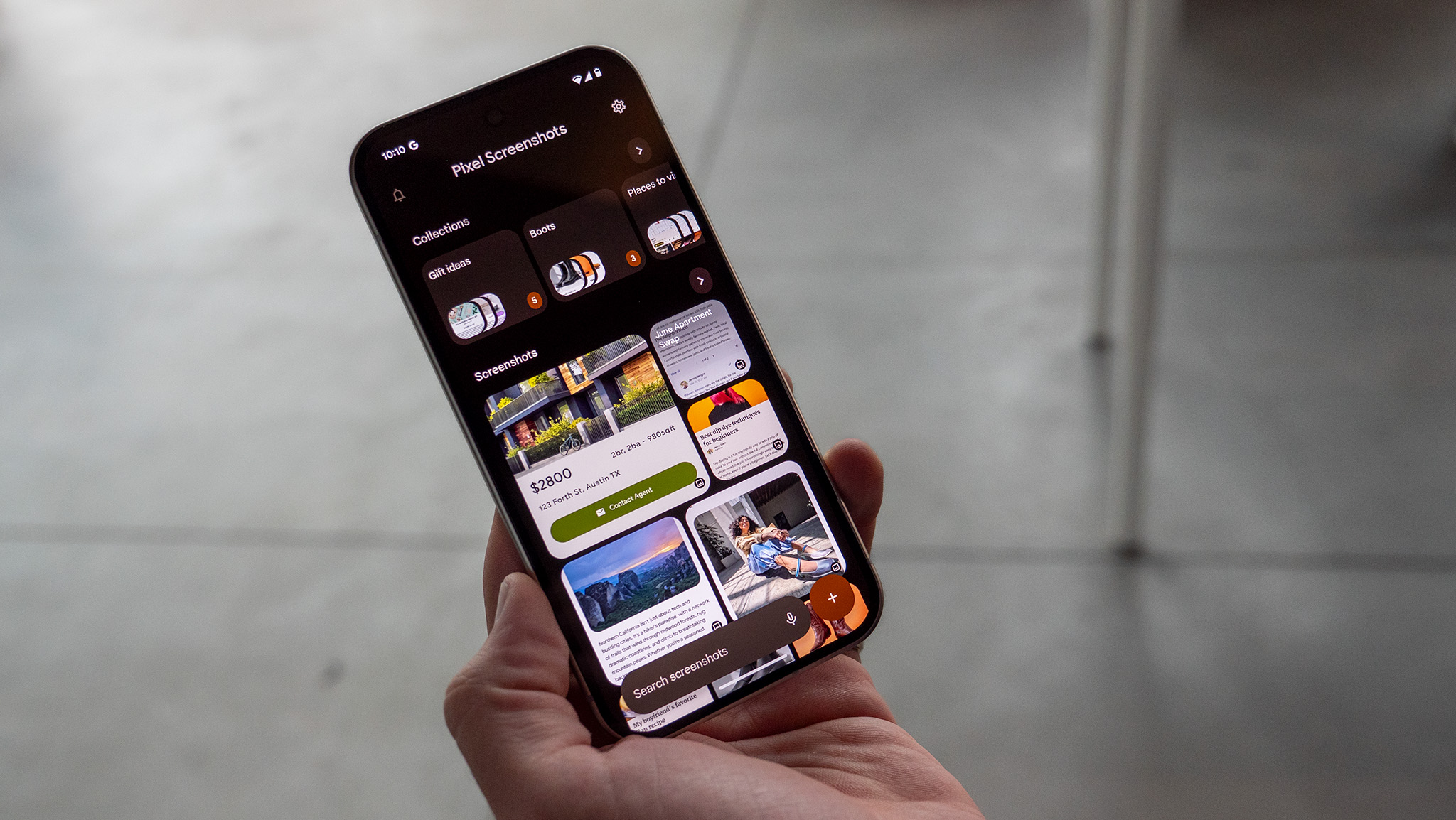
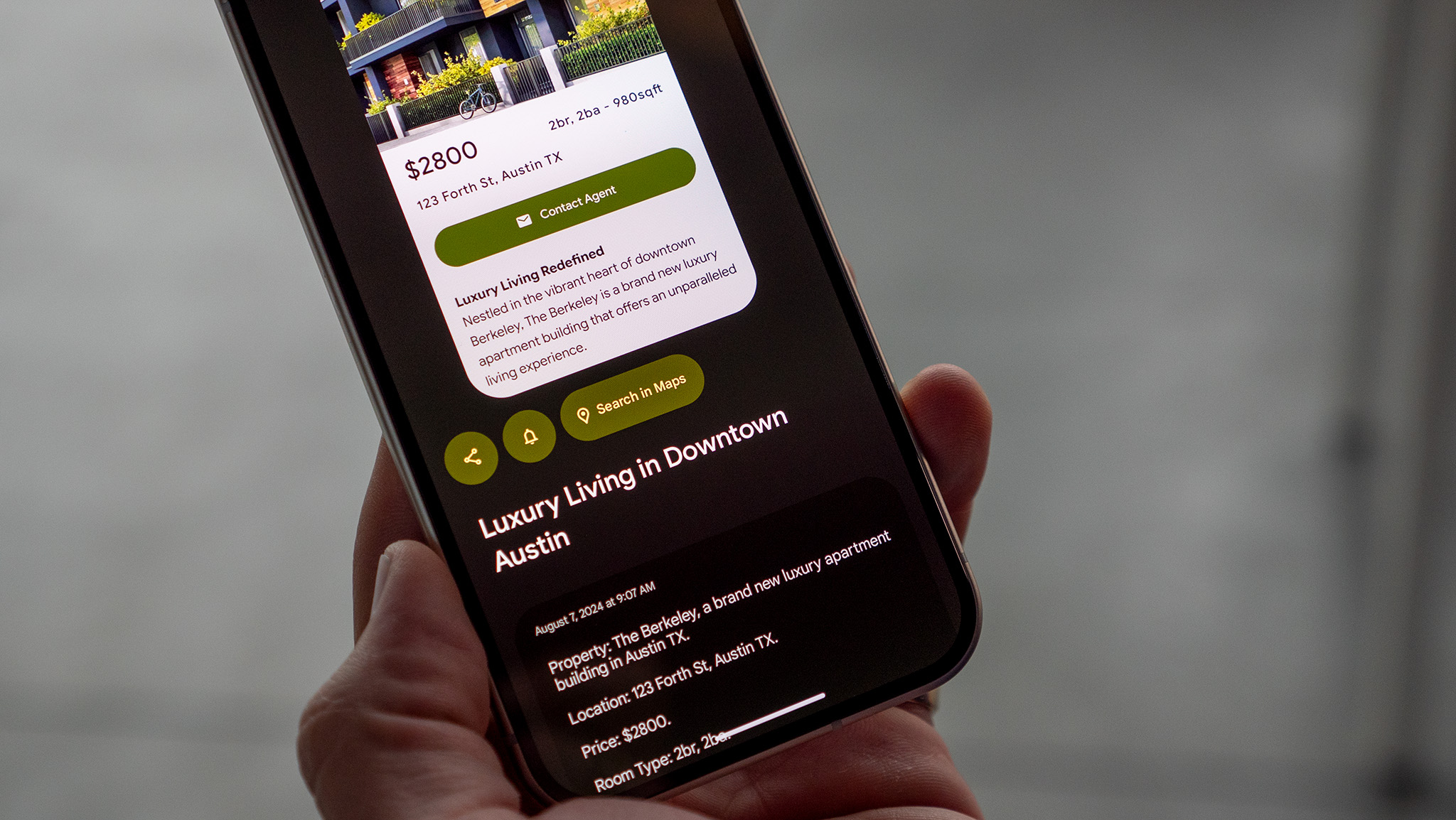
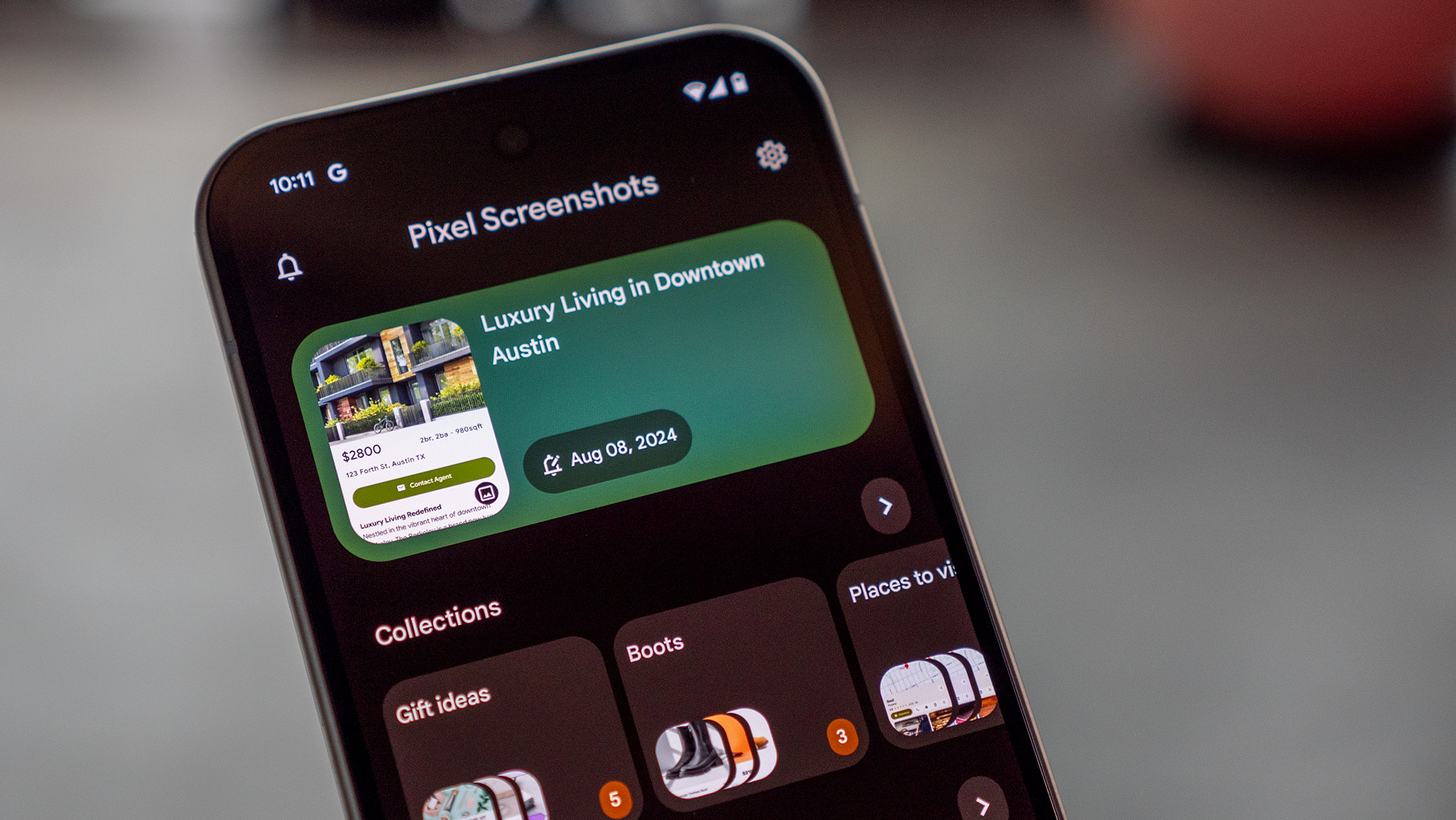
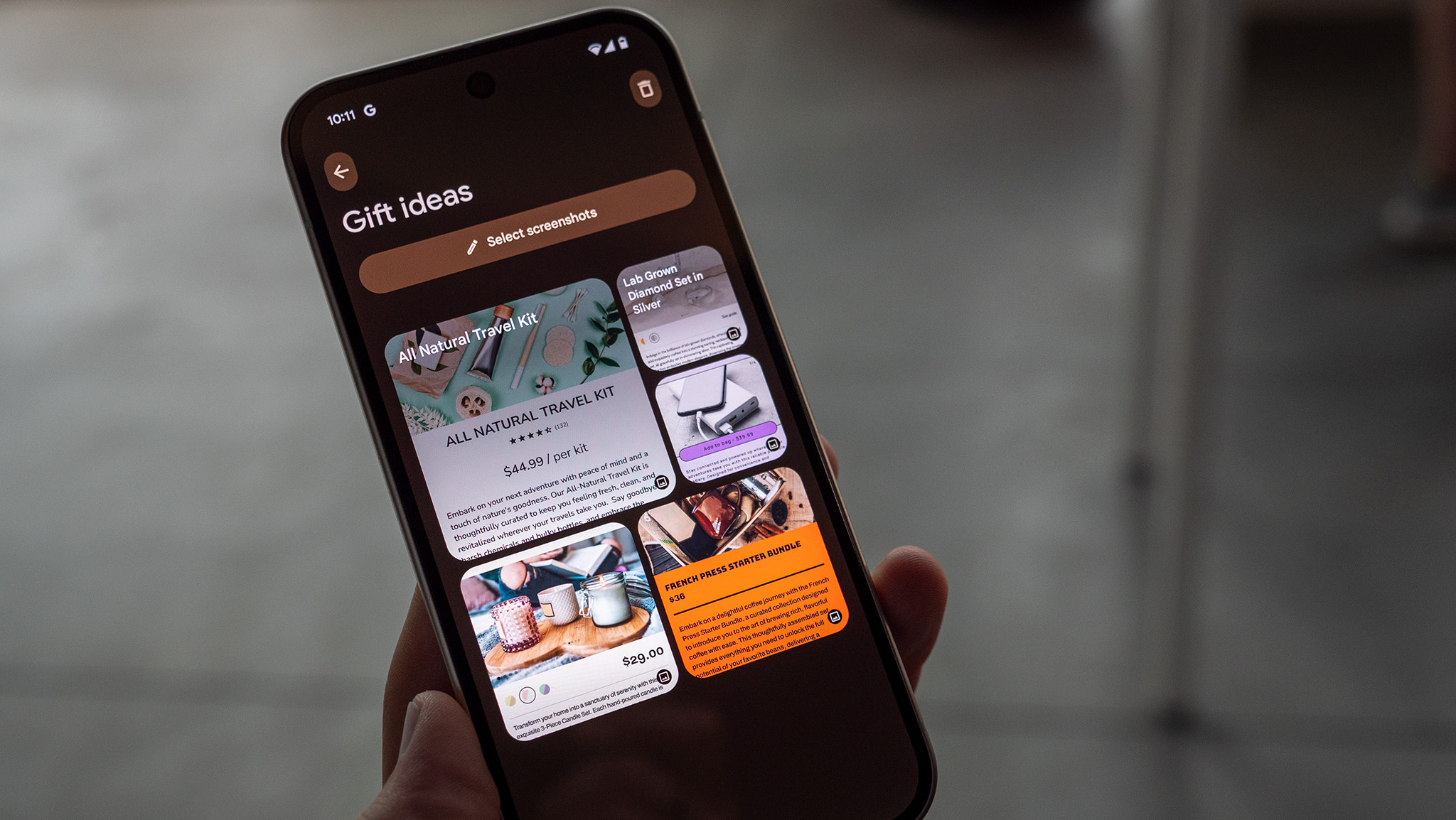
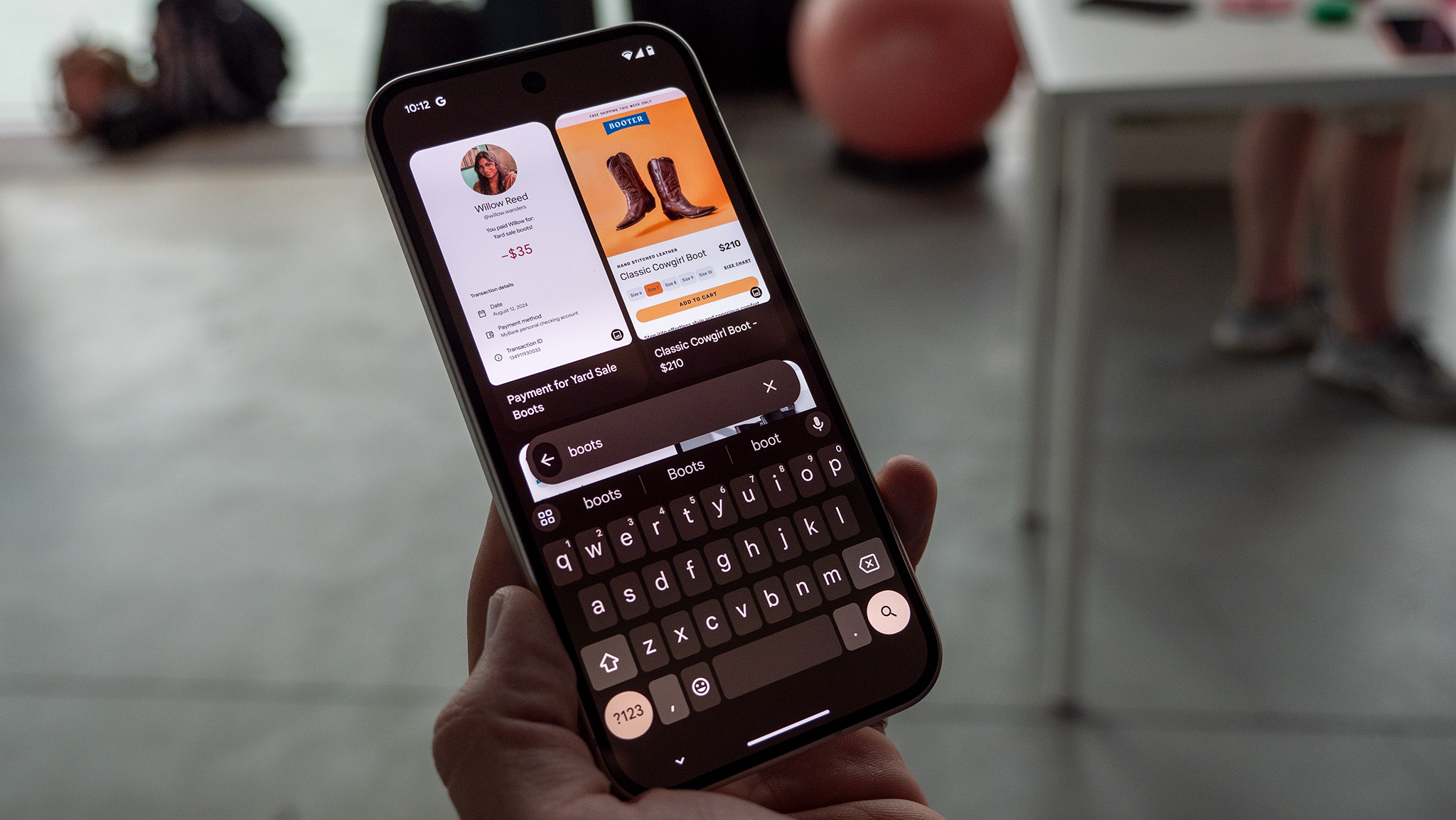
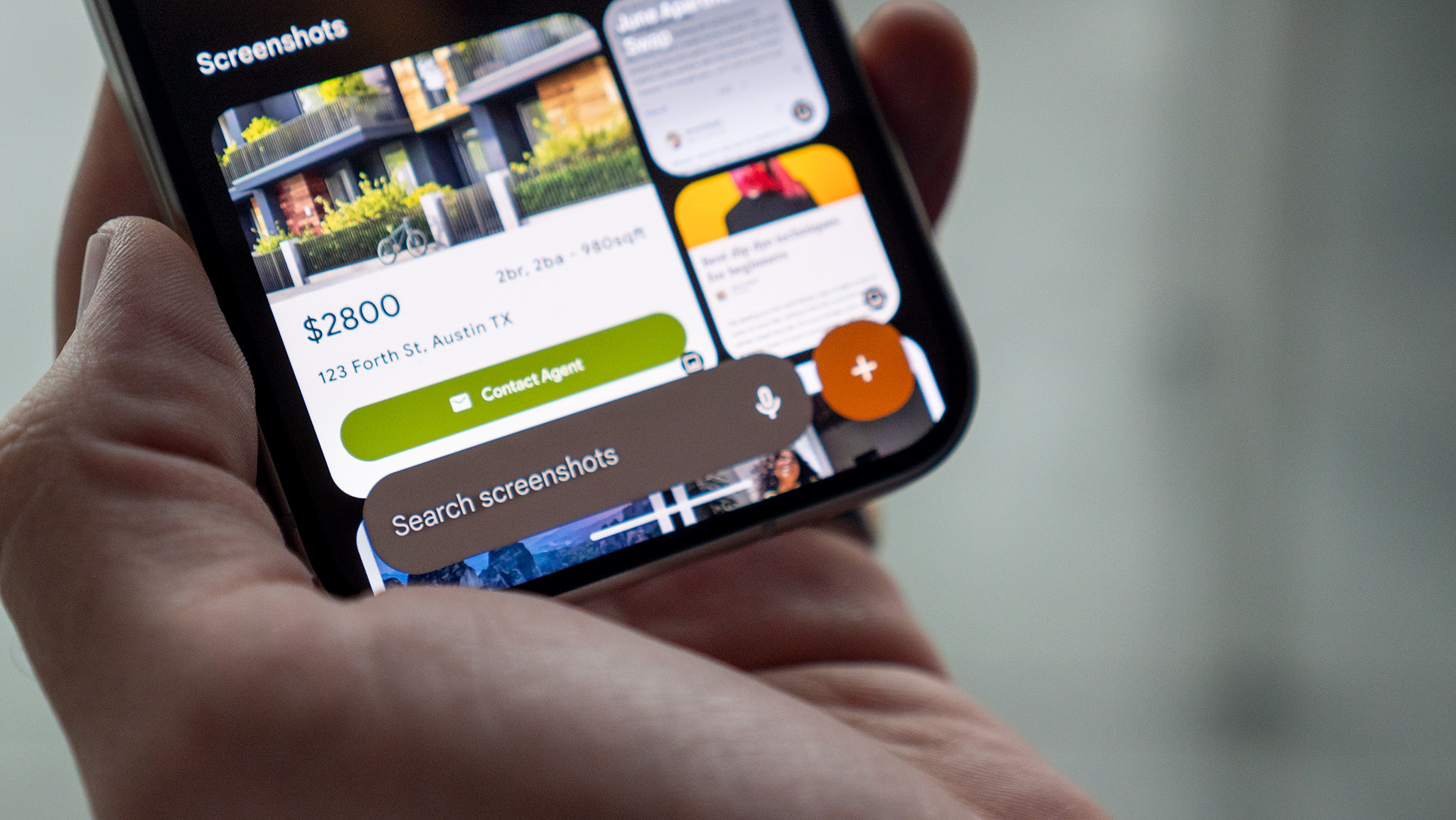
Now, on to the really fun stuff! Google is overhauling how screenshots work on the Pixel 9, starting with a contextual understanding of screenshots as they are taken. When you capture a screenshot, the screenshot pop-up will now feature actionable chips (buttons).
The Pixel Screenshots app is a new way to catalog and search all of your screenshots, including any info contained inside of those screenshots by using AI.
In one example, we searched for the Olympic closing ceremonies, took a screenshot of the Google search results, and a button to add a calendar event to our calendar appeared right on the screenshot pop-up. It felt like the perfect evolution of the old "what on my screen" feature from Google nowadays.
Additionally, a new Pixel Screenshots app will catalog all saved screenshots, giving you the ability to quickly search for information inside of those screenshots. Pulling up any screenshot in this new app will give you a list of information present in the screenshot, and screenshots can even be added to collections and tagged for easier searching later.
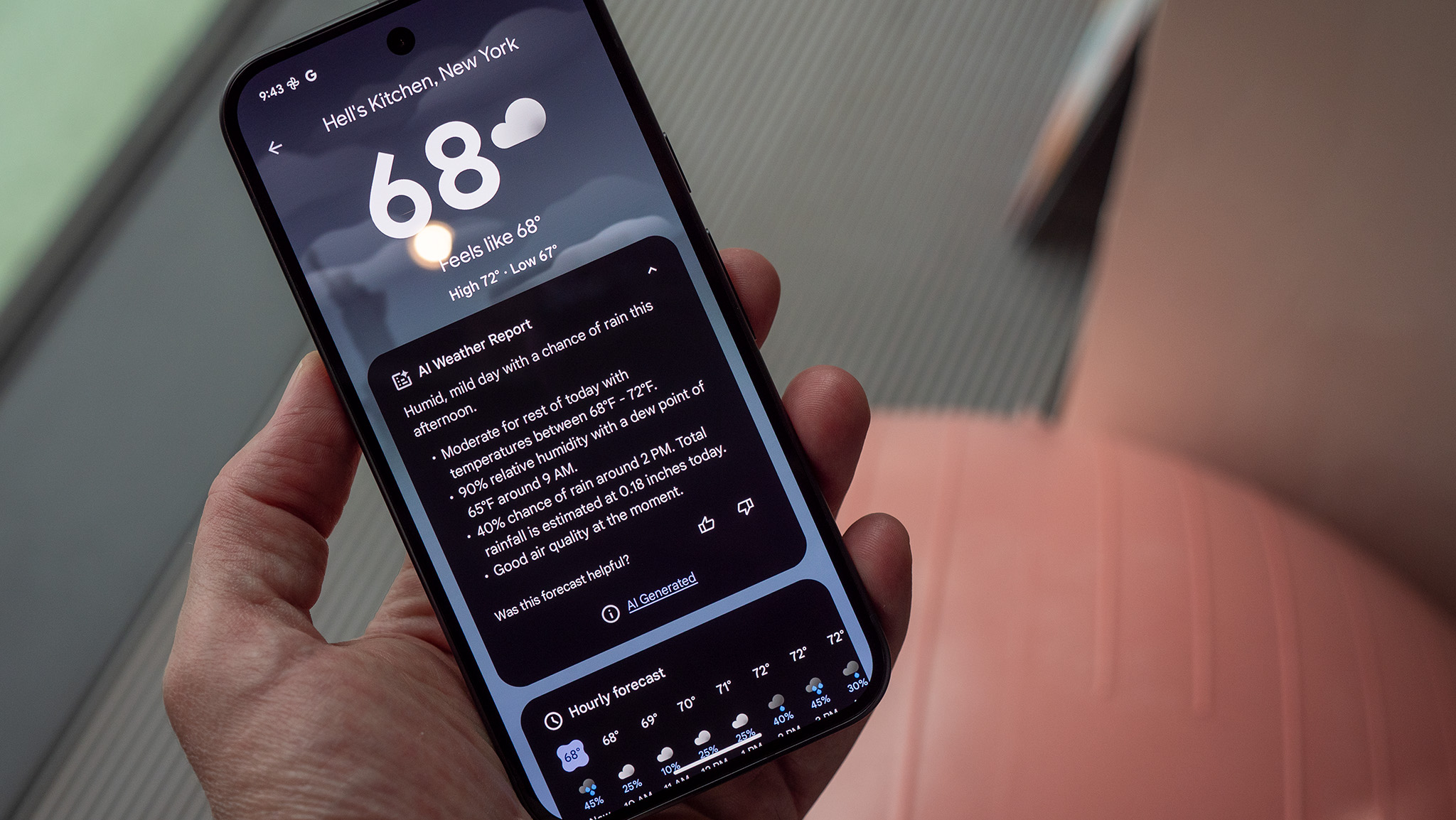
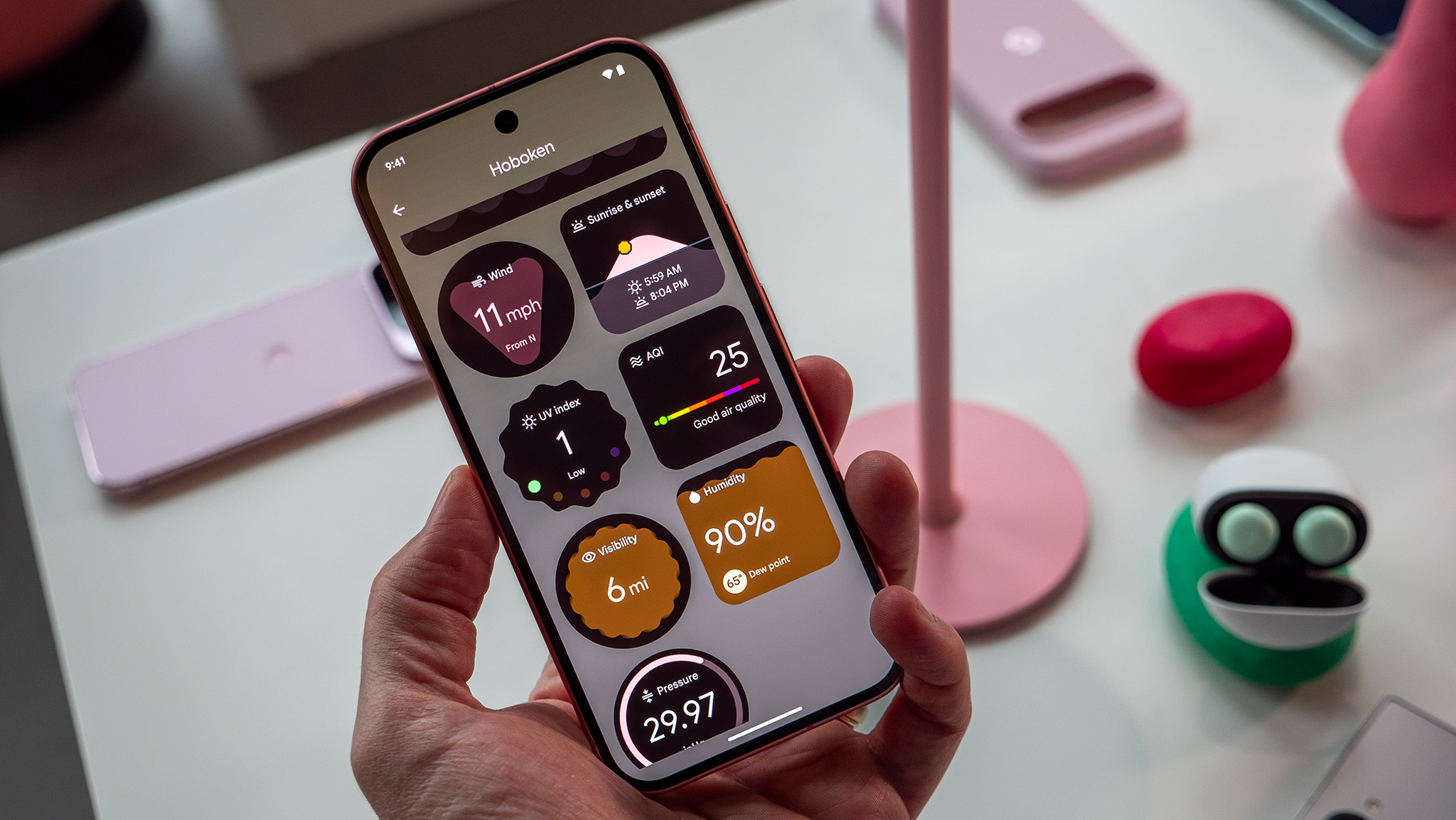
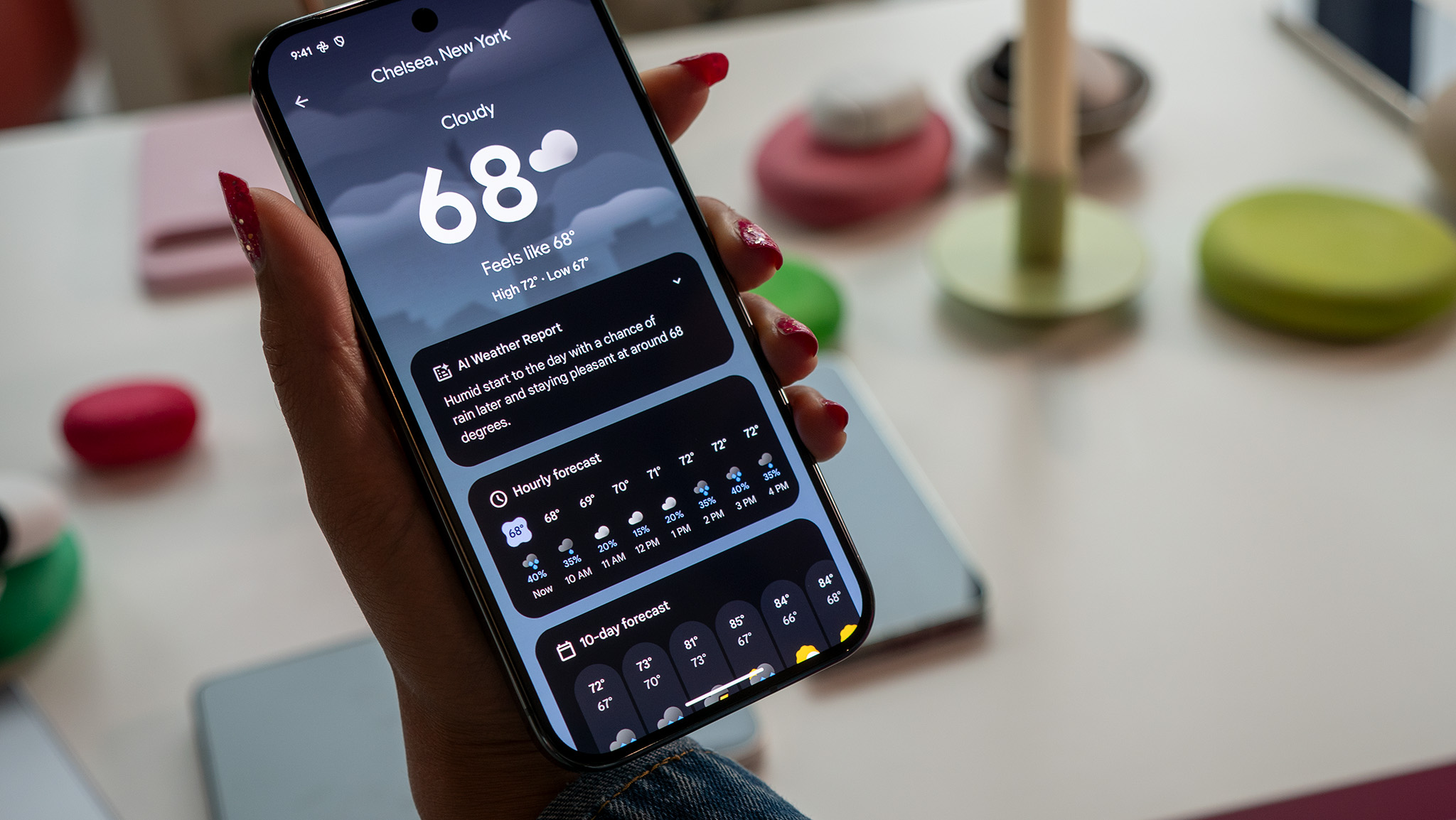
The Pixel Weather app has a handy AI summary of the weather up top complete with detailed widgets below.
A brand new Pixel Weather app is launching with the Pixel 9, including a fancy new UI and a headliner AI summary feature. Right at the top, you'll find an AI-generated summary of the day's weather, followed by the usual set of stats and graphs for more detailed info.
Pixel Weather is an evolution of the current lovable weather view in the Google app, just without the frogs. The summary view seemed helpful, and the widgets found when scrolling down reminded me a lot of the Nothing Weather app found on phones like the CMF Phone 1.
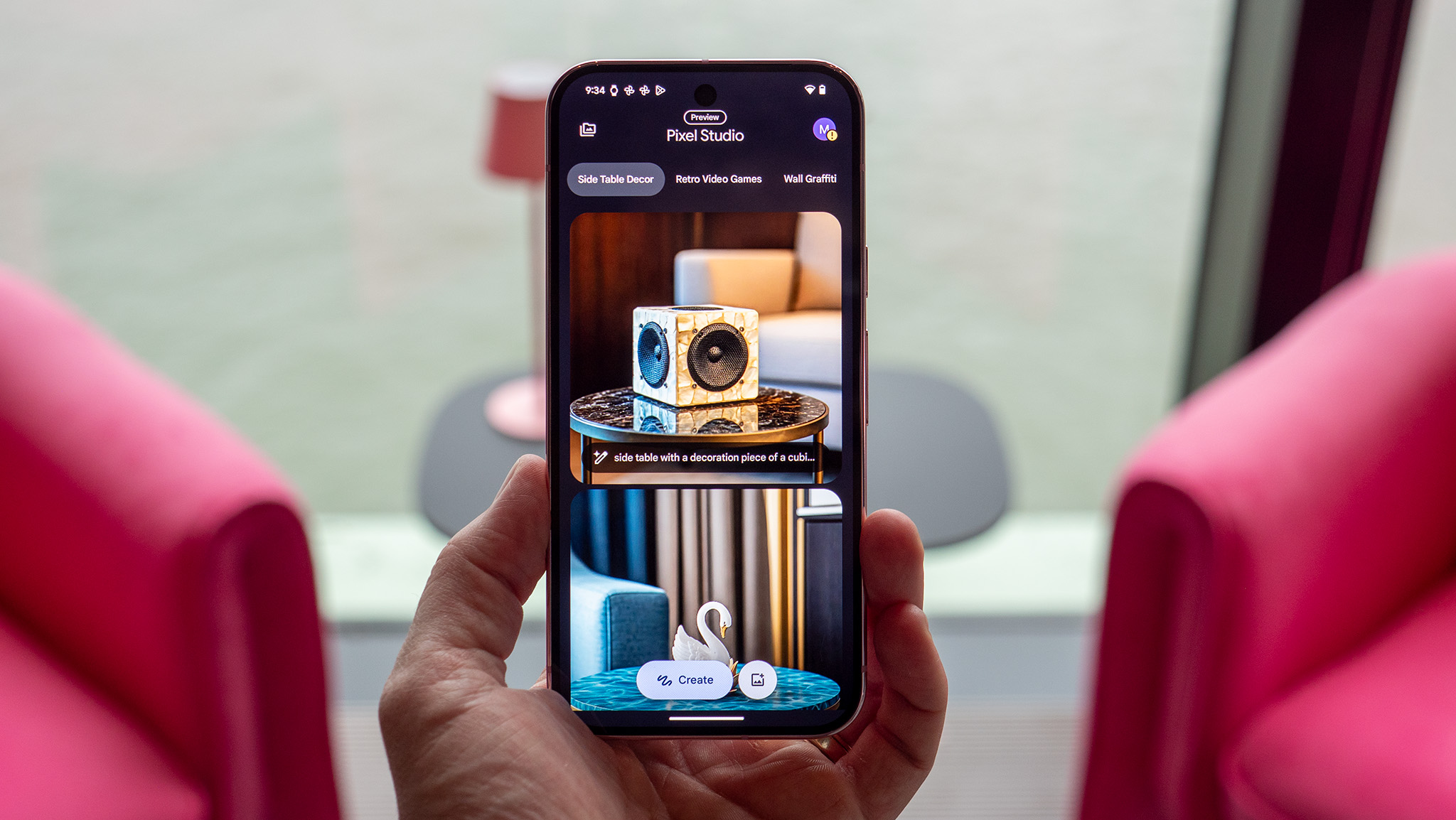
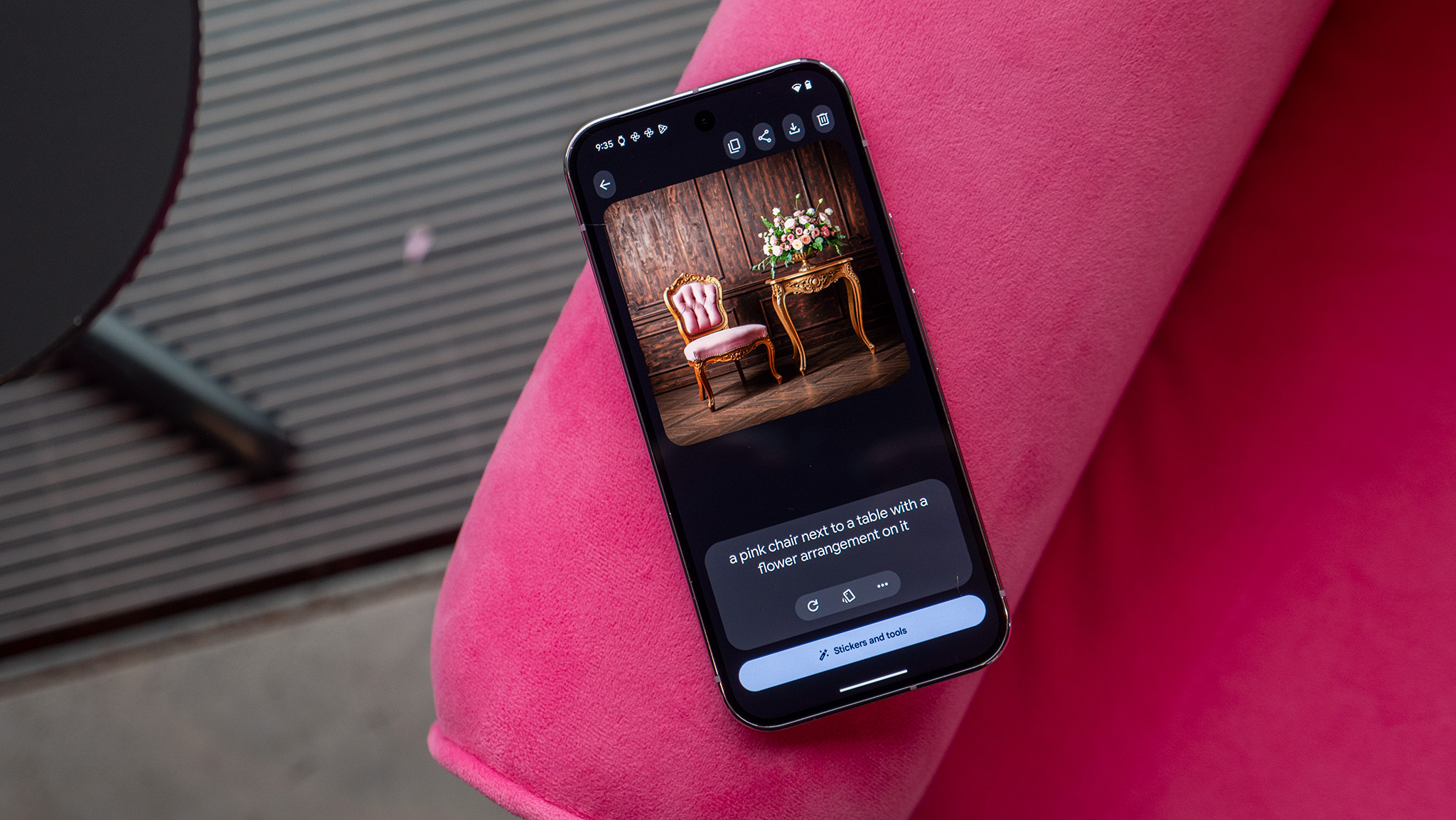
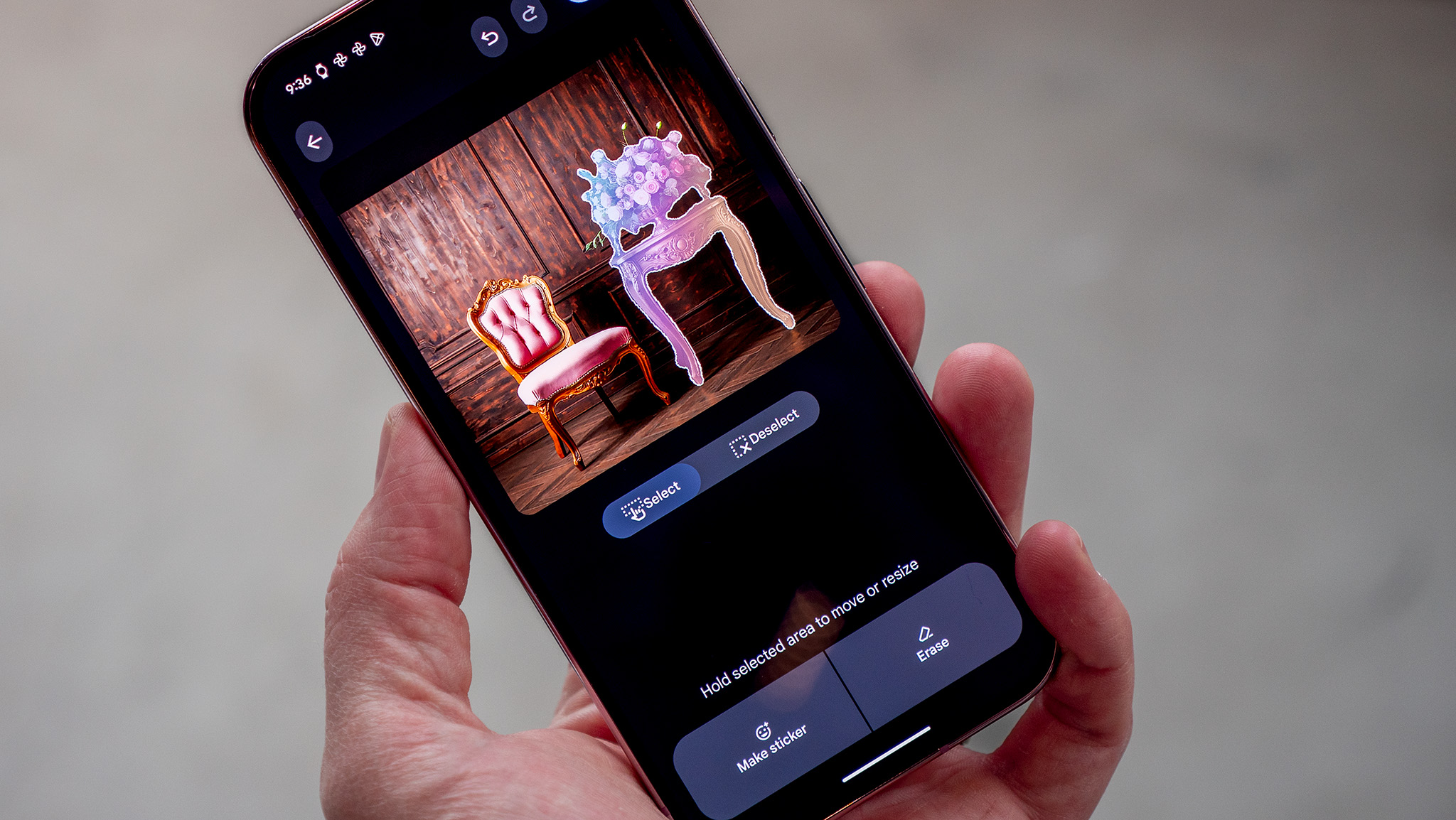
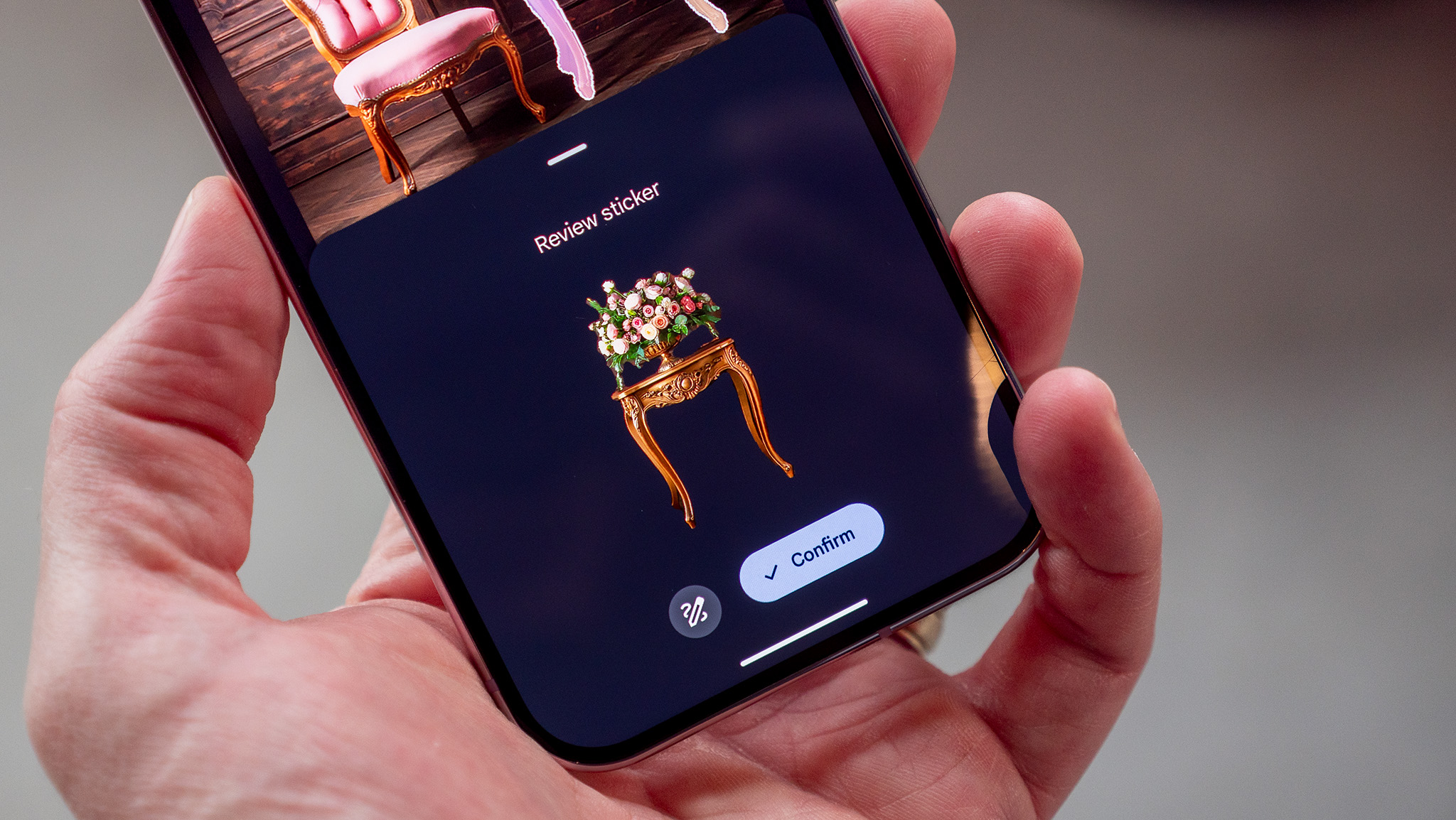
Pixel Studio lets you generate emoji stickers, memes, and anything else you can think of using on-device Gemini.
Pixel Studio is another new Pixel 9 app that utilizes on-device image generation in some creative ways. Like other LLM-driven image generation apps, a text prompt can be input and will quickly generate an image in a second or two. But that's boring and has been done a hundred times over, so here's what's actually cool.
Google not only made it so that Gemini can properly create text — other LLMs often generate garbled nonsense even when you ask them to add specific text — but you can create flyers, notes, and even stickers to be used as emojis in conversations. Folks who love memes will thoroughly enjoy Pixel Studio, as it lets them create something new and memeable every time.
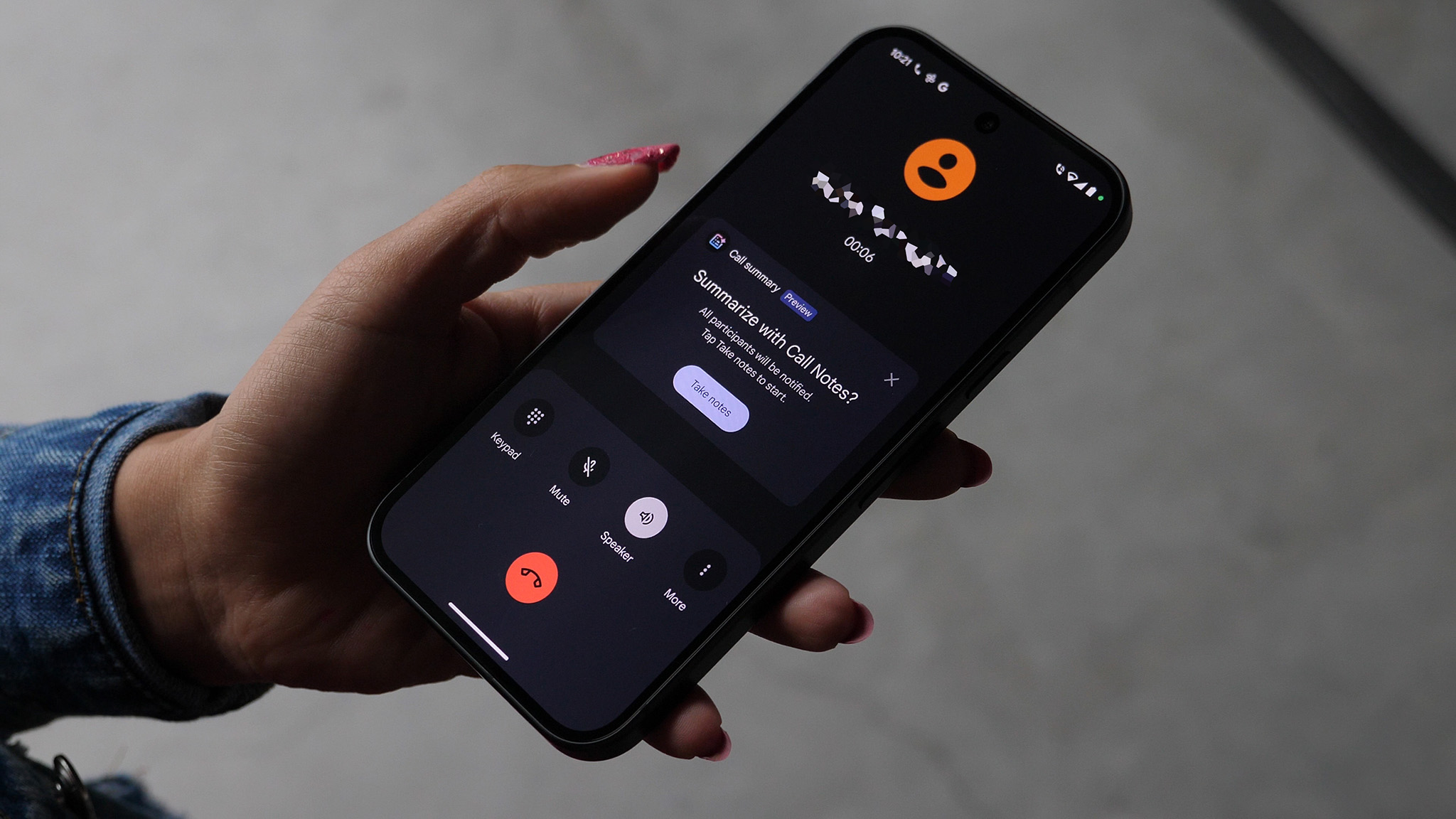
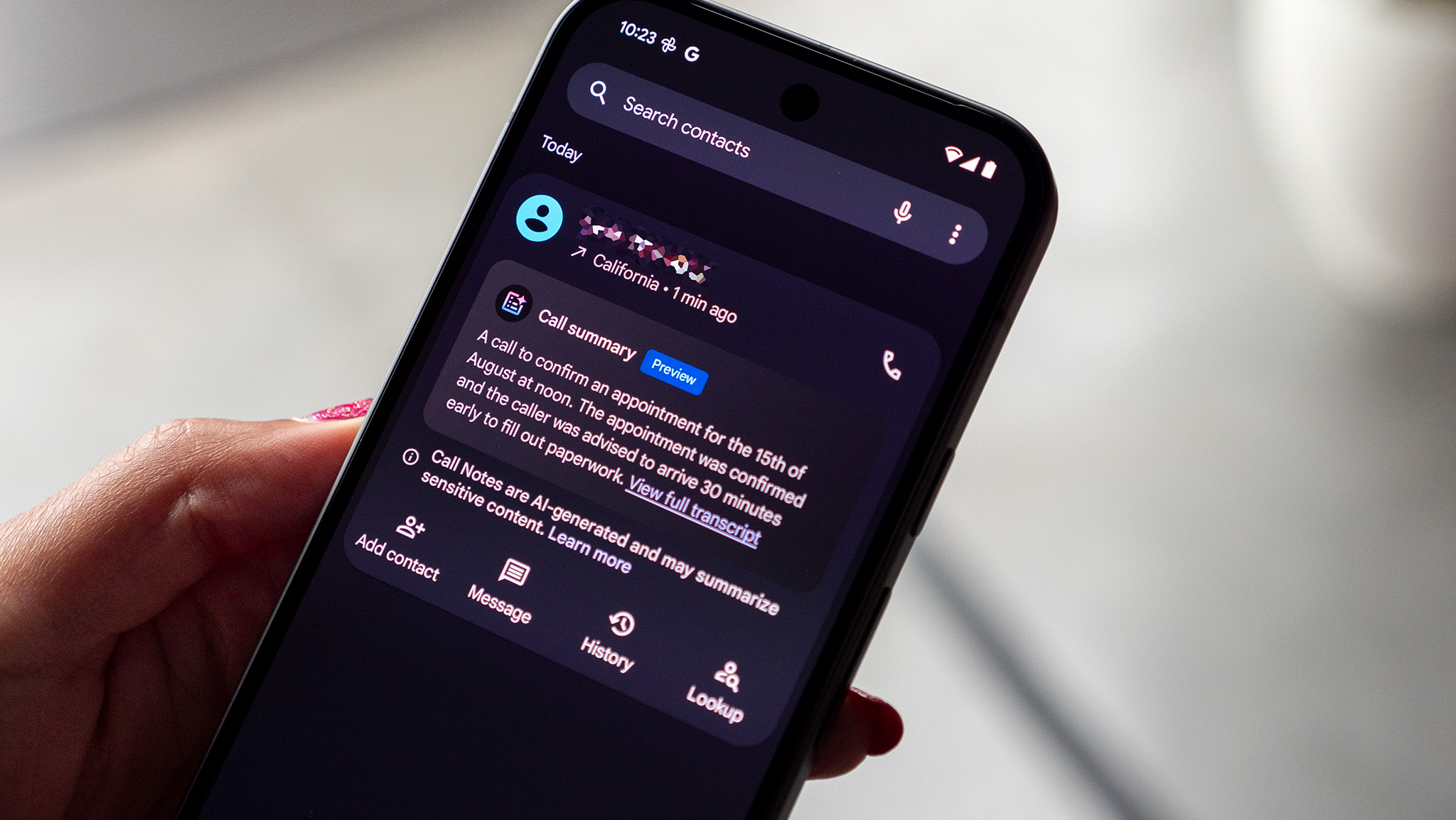
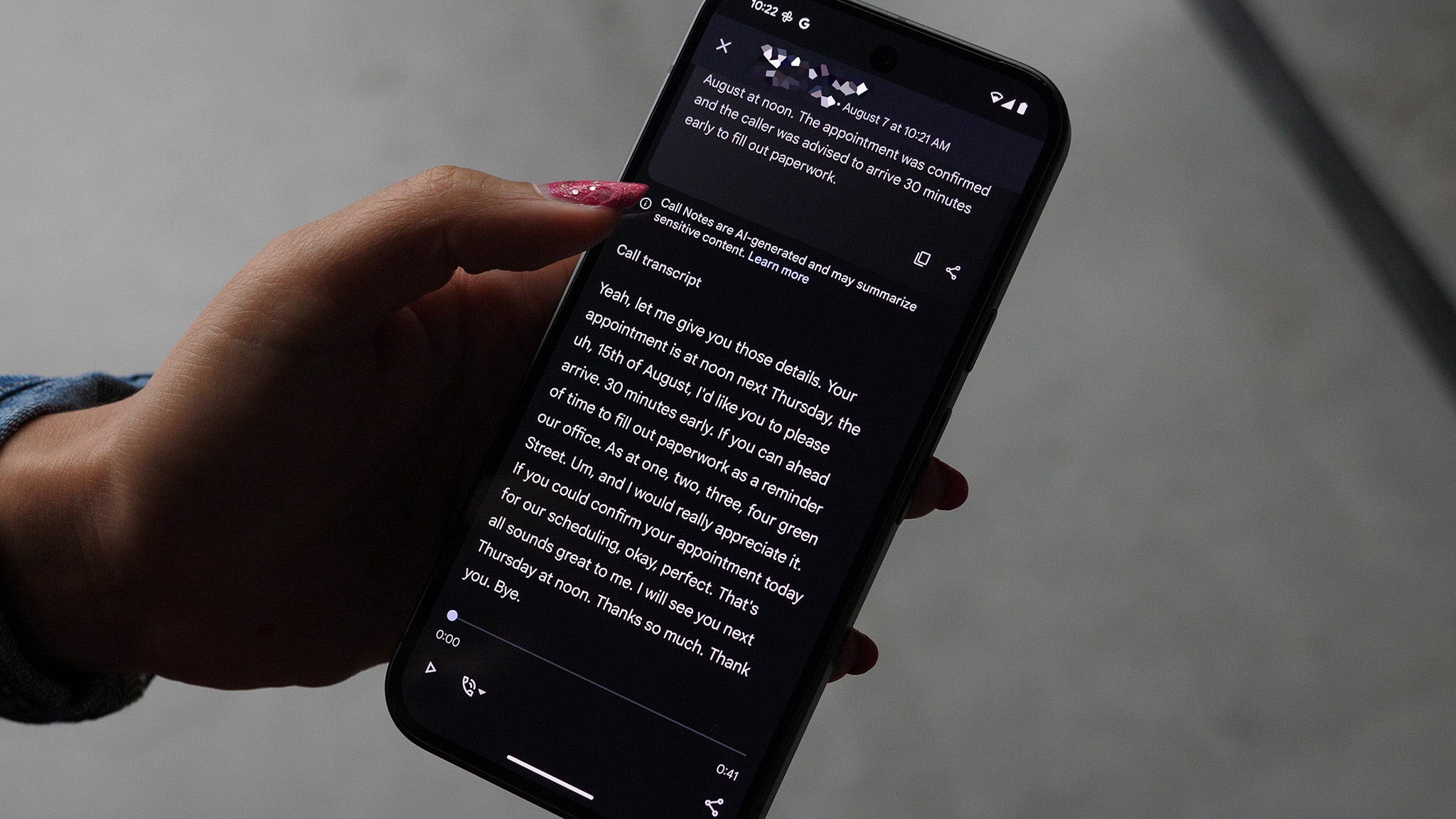
Call Notes will auto-summarize any call you're on, plus generate a full transcript using the Pixel Recorder engine.
Lastly, there is a new Call Notes feature that uses onboard Gemini processing to listen to a phone call and deliver a summary and transcript of the call at the end. This one uses the same excellent tech in the Pixel Recorder app but adds to it by creating a quick summary for each call used.
Call Notes has to be activated at the beginning of each call and audibly announces to the person on the other end that the call is being recorded and transcribed, so it's not a secret when you're recording.
Google Pixel 9 series: Specs
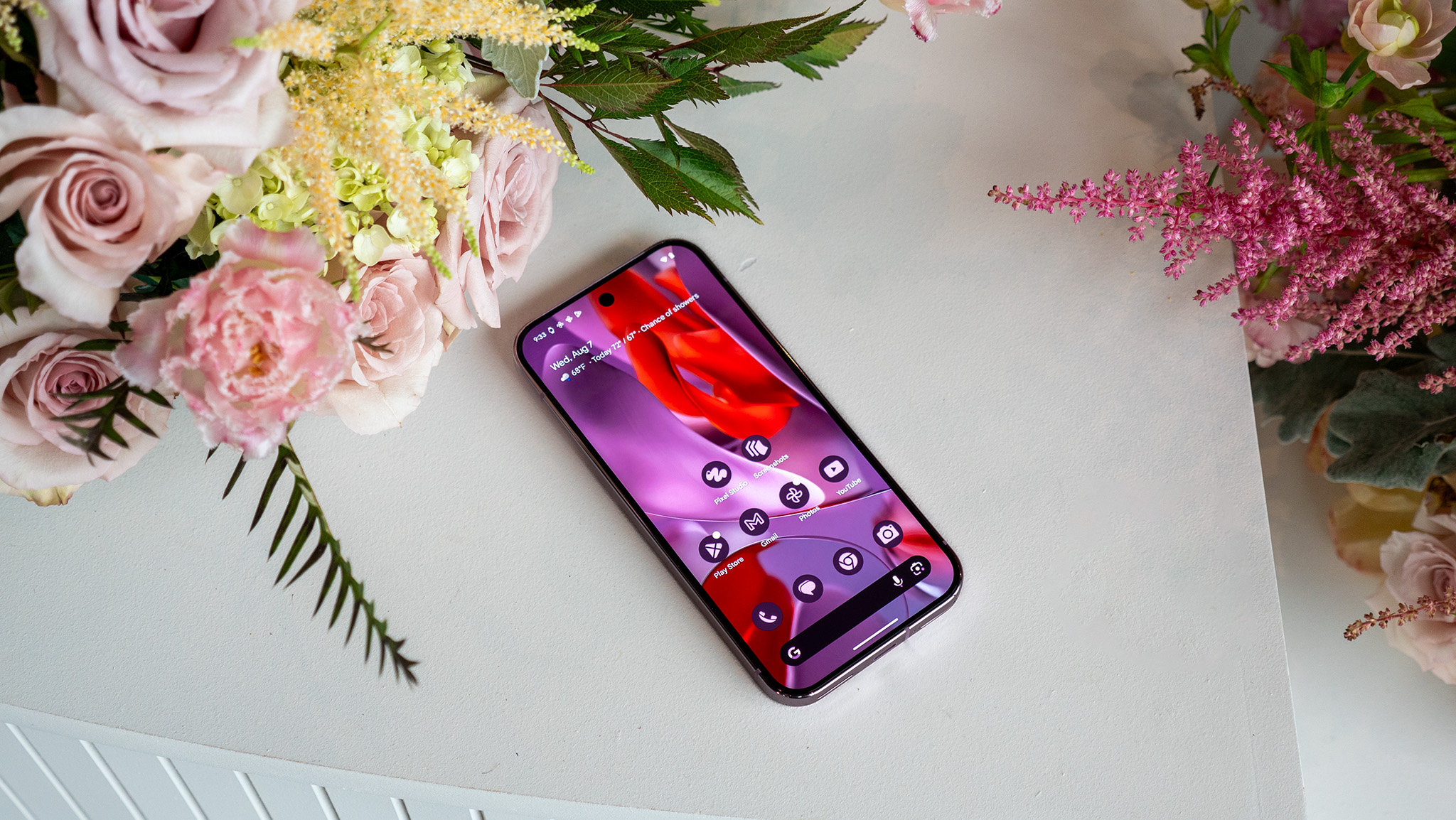
Sometimes, it's nice to see all the specs in one place so you can make the best decision. The Pixel 9 likely gives most people the best bang for the buck, but folks looking for a more performant phone with even better cameras should look toward one of the Pixel 9 Pro models.
The only real difference between the Pixel 9 Pro and Pixel 9 Pro XL are the display and battery sizes, which are larger to fit the larger phone size.
| Category | Google Pixel 9 | Google Pixel 9 Pro | Google Pixel 9 Pro XL |
|---|---|---|---|
| Display | 6.3-inch Actua display, 120Hz AMOLED (60-120Hz), 2400x1080, HDR, 2700 nits, Gorilla Glass Victus 2, 240Hz PWM dimming | 6.3-inch Super Actua display, 120Hz LTPO AMOLED (1-120Hz), 2856x1280, HDR, 3000 nits, Gorilla Glass Victus 2, 240Hz PWM dimming | 6.8-inch Super Actua display, 120Hz LTPO AMOLED (1-120Hz), 2992x1344, HDR, 3000 nits, Gorilla Glass Victus 2, 240Hz PWM dimming |
| Chipset | Google Tensor G4, Titan M2 security module | Google Tensor G4, Titan M2 security module | Google Tensor G4, Titan M2 security module |
| RAM | 12GB | 16GB | 16GB |
| Storage | 128GB/256GB | 128GB/256GB/512GB/1TB | 128GB/256GB/512GB/1TB |
| Rear camera 1 | 50MP f/1.68, 1/1.31" sensor, Octa PDAF, 82-degree FoV, OIS, 4k/60 recording | 50MP f/1.68, 1/1.31" sensor, Octa PDAF, 82-degree FoV, OIS, 4k/60 recording | 50MP f/1.68, 1/1.31" sensor, Octa PDAF, 82-degree FoV, OIS, 4k/60 recording |
| Rear camera 2 | 48MP f/1.7, 1/2.55" sensor, 123-degree wide-angle, macro, autofocus, Quad-PD, 4k/60 recording | 48MP f/1.7, 1/2.55" sensor, 123-degree wide-angle, macro, autofocus, Quad-PD, 4k/60 recording | 48MP f/1.7, 1/2.55" sensor, 123-degree wide-angle, macro, autofocus, Quad-PD, 4k/60 recording |
| Rear camera 3 | N/A | 48MP f/2.8, 1/2.55" sensor, OIS, 5x optical zoom, Quad PD, 4k/60 recording | 48MP f/2.8, 1/2.55" sensor, OIS, 5x optical zoom, Quad PD, 4k/60 recording |
| Rear LDAF sensor | Single-zone laser autofocus | Multi-zone laser autofocus | Multi-zone laser autofocus |
| Front camera | 10.5MP f/2.2, 95-degree wide-angle, autofocus, 4k/60 recording | 42MP f/2.2, 103-degree wide-angle, autofocus, 4k/60 recording | 42MP f/2.2, 103-degree wide-angle, autofocus, 4k/60 recording |
| Connectivity | Wi-Fi 7, 5G (mmWave and Sub-6), Bluetooth 5.3, NFC, AptX HD, USB-C 3.2, Physical and eSIM, Satellite SOS | Wi-Fi 7, 5G (mmWave and Sub-6), Bluetooth 5.3, NFC, AptX HD, USB-C 3.2, Physical and eSIM, Satellite SOS | Wi-Fi 7, 5G (mmWave and Sub-6), Bluetooth 5.3, NFC, AptX HD, USB-C 3.2, Physical and eSIM, Satellite SOS |
| Ingress Protection | IP68 dust and water resistance | IP68 dust and water resistance | IP68 dust and water resistance |
| Security | In-screen ultrasonic fingerprint module, face unlock | In-screen ultrasonic fingerprint module, face unlock | In-screen ultrasonic fingerprint module, face unlock |
| Audio | Stereo sound, USB-C | Stereo sound, USB-C | Stereo sound, USB-C |
| Battery | 4700mAh, 45W wired charging, 20W wireless charging, 5W reverse wireless charging | 4700mAh, 45W wired charging, 20W wireless charging, 5W reverse wireless charging | 5060mAh, 45W wired charging, 20W wireless charging, 5W reverse wireless charging |
| Dimensions | 152.8 x 72 x 8.5mm, 198g | 152.8 x 72 x 8.5mm, 199g | 162.8 x 76.6 x 8.5mm, 221g |
| Colors | Obsidian, Porcelain, Winter | Obsidian, Porcelain, Hazel, Rose Quartz | Obsidian, Porcelain, Hazel, Rose Quartz |
| Software support | 7 years of Pixel and OS updates | 7 years of Pixel and OS updates | 7 years of Pixel and OS updates |
Google Pixel 9 series: Starting over...again?
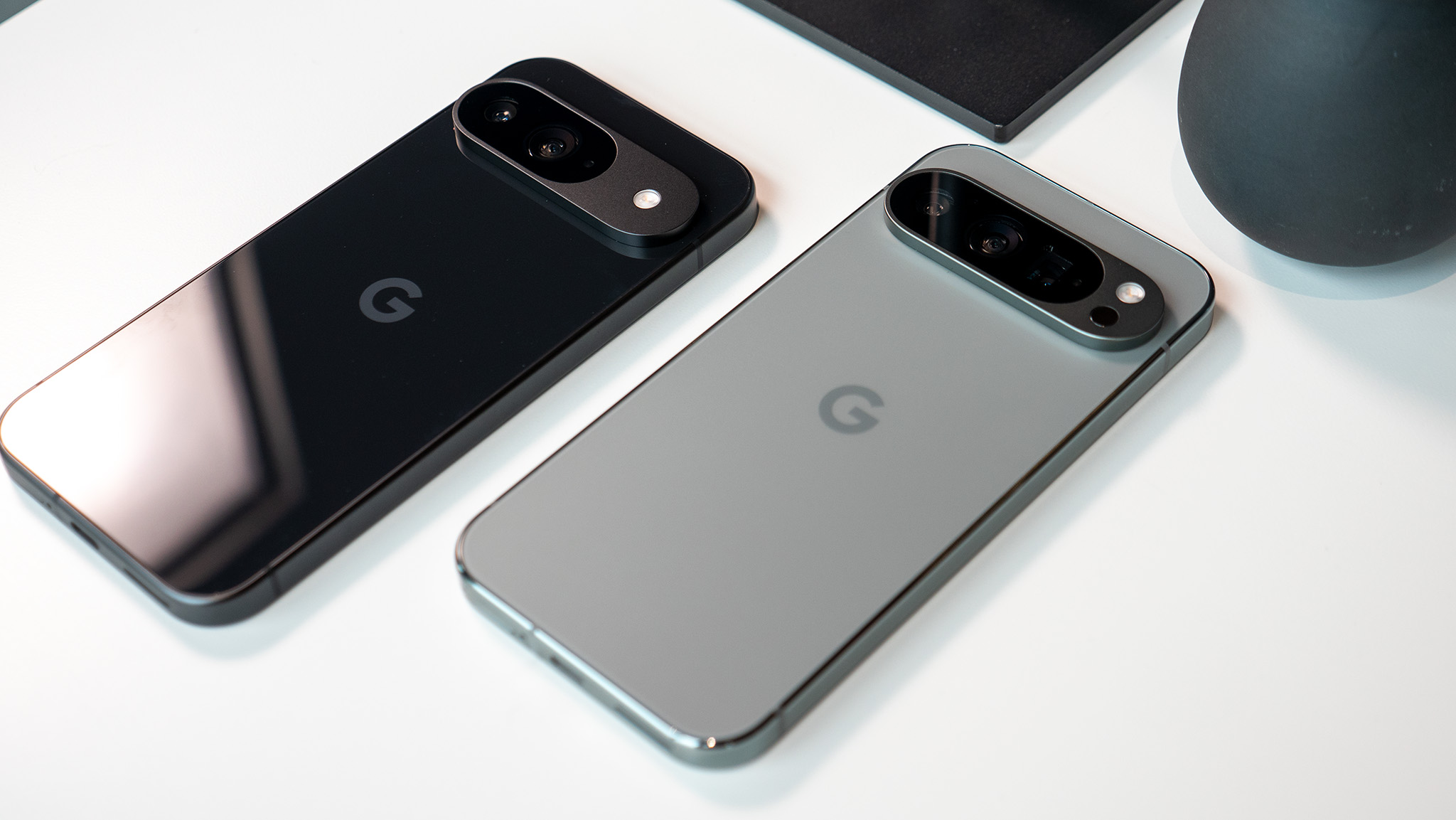
In many ways, the Pixel 9 series feels like Google is starting things over once again. The Pixel 6 felt like the first "proper" flagship Pixel phone, but the series has been plagued with bugs over the past few years and left a sour taste in many people's mouths.
Still, the Pixel lineup continues to grow its market share thanks to a plethora of unique features, a history of having the best cameras on any smartphone, years of support, including regular updates and feature additions, and a friendly UI and hardware.
Now, Google seems to be turning a new page, including super premium hardware — with applicable price increases — an increased reliance on smart AI-driven software, and a line of four phones that give users price, size, and form factor options, all with the same great features. Despite being mixed on the look of these new phones, I'm more excited to use a Pixel than ever before, and it's clear that Google understands how AI can help users instead of just taking on mostly useless features as we've seen in other phones in 2024.

You must confirm your public display name before commenting
Please logout and then login again, you will then be prompted to enter your display name.
